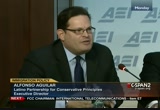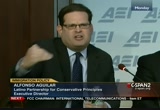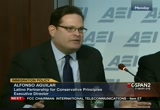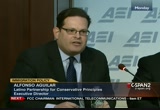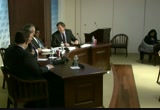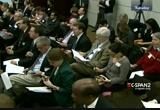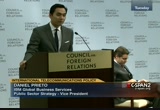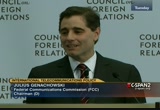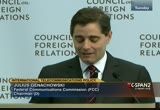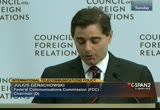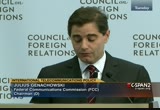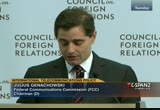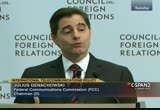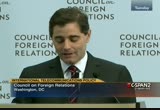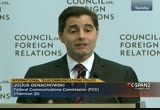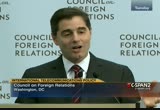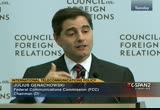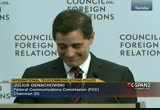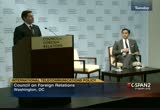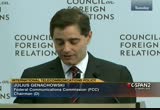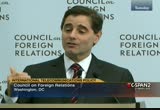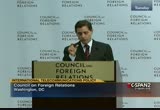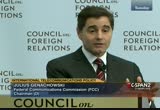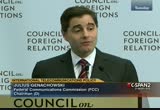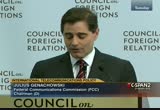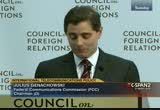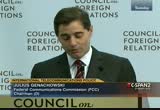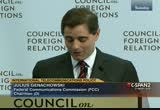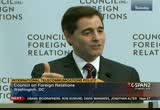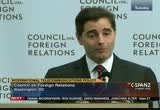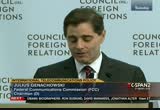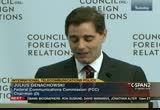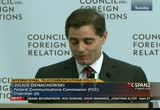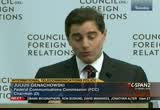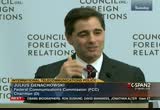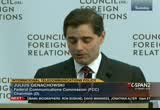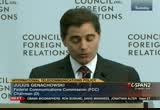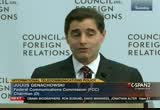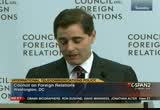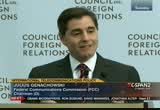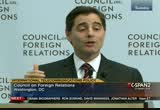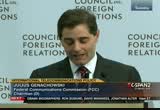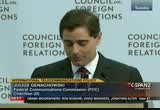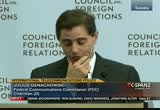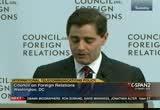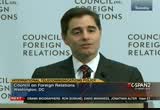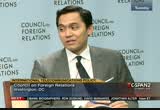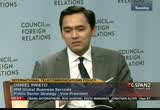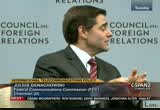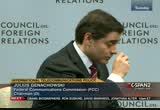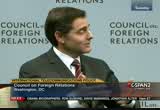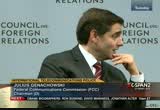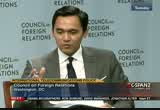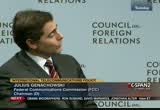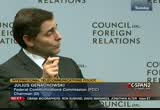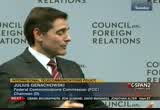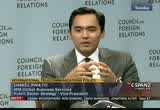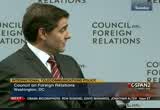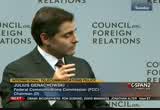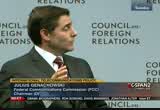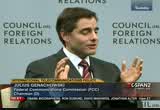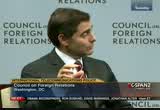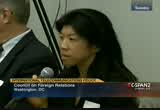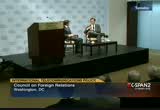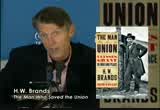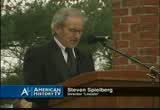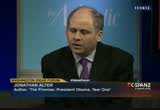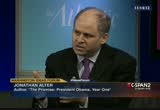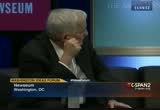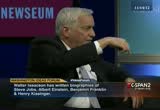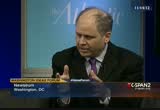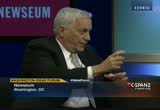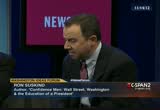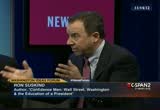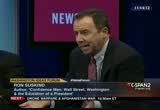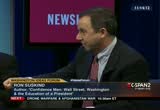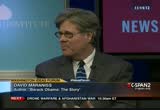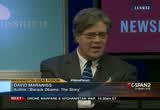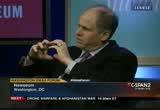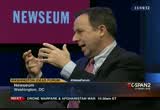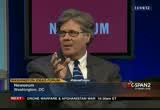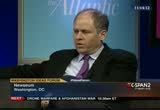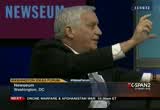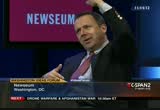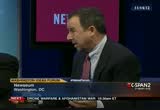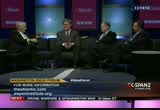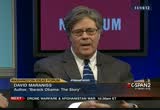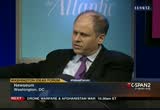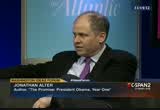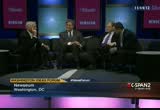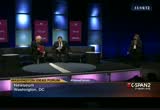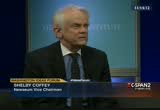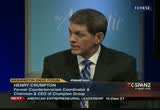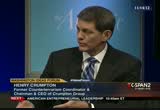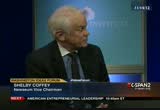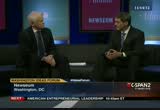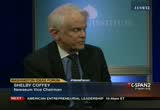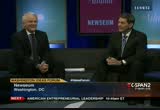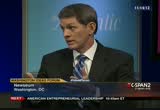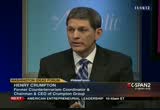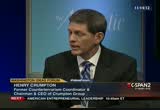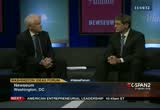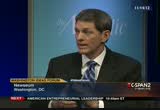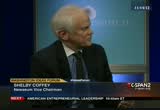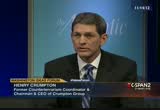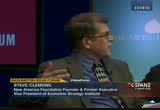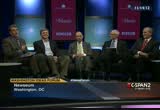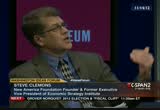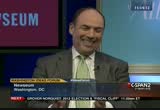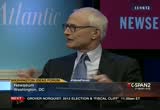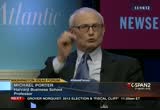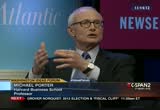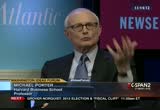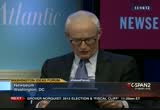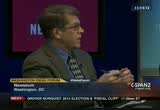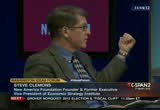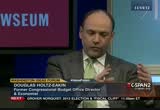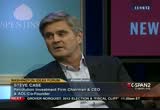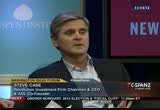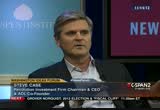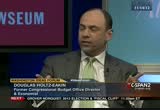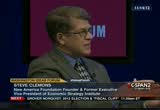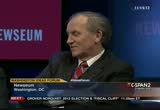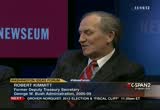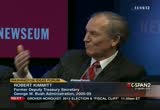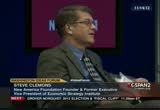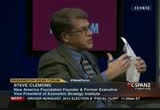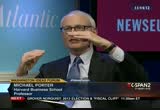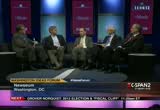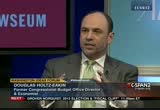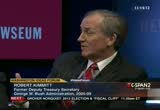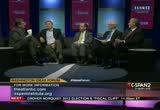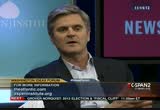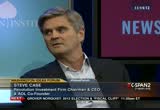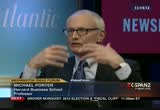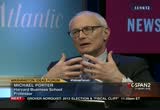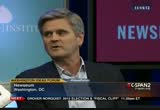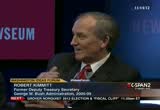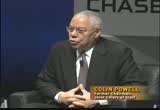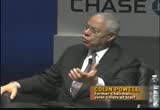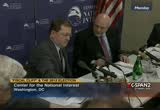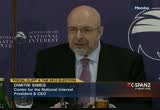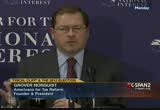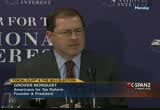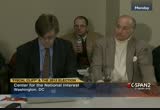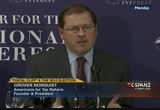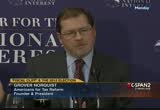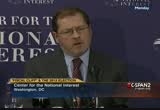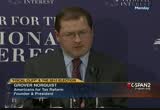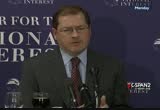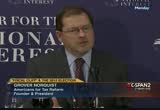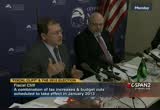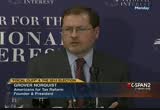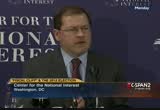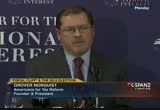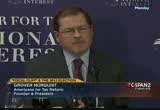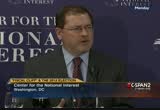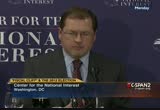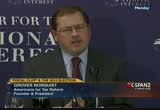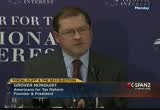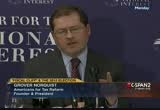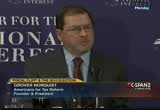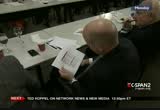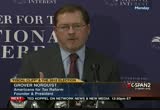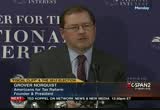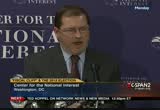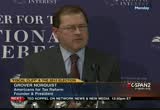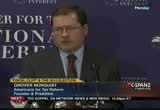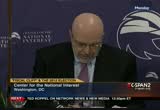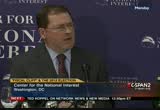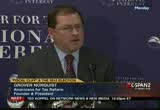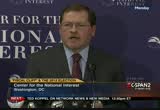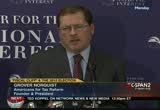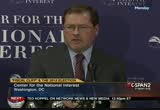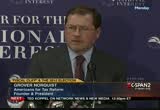tv U.S. Senate CSPAN November 21, 2012 9:00am-12:00pm EST
9:00 am
let me very quickly address this issue of the party. part of the immigration discussion, and of the come with the anti-immigrant wanted to do was to scare republicans by saying that latinos will never be republican. i mean, i heard some other comments ramesh they come and they can't disagree with him more, because it's such an early -- i hear so many times about latinos, and a conservative, it just shows a lack of understanding of the latino community. latinos are extremely, opening businesses three times as fast as the national average. latinos are people of faith. the majority of latinos begin in
9:01 am
the life to -- the right to life. on marriage, latinos were decisive to pass proposition eight in california, 53% of latinos voted for proposition eight in california. we are extremely conservative. i think, and we also have to understand there's some difference between the old latino community of say 20, 30 years ago what i call the cesar chavez a team community, and, the new york, the puerto ricans in new york and chicago, and those in the southwest, been in the u.s. since the was basically took half of mexico. and the new latino population which is foreign-born, 40% foreign-born, and the rest of the children of immigrants. very conservative. i know when asked about government they may give answers that are not extraordinary, but sometimes we get tangled, caught up with polls.
9:02 am
resort have seen in this election cycle. and i think with latinos we cite polling with specific issues but is that a better understanding of where they're coming from you will get an understanding of why they're answering the questions that way. but i believe with the latino community, we lost the latino vote because of immigration. if we would have a better position on immigration, from the get-go, from the primary governor romney would've been competitive and it would've been competitive in those battleground states where the latino vote was decisive. and, finally, we have to stop being rockefeller republicans. we are not the party of the 47%. you know, when governor romney said what he did last week that obama won because it gives to latinos and other minorities, that's insulting. latinas didn't vote for obama because obamacare. i think he is engaging obama in the same type of class warfare
9:03 am
discussion that obama wants to have. i think we have to go back to the conservative populism of ronald reagan, which is to talk about the economy. but i would say something is. romney only emphasized -- very quickly. we cannot run only on an economic message. we have the full conservatives on social issues, on the national security, and on the economy. spent and aspirational. aspirational a mechanism where you are free to go as far as you want to go and to do what you want to do. and you are right about the hispanic community, especially they are very and trunk -- entrepreneurial. guess what. they start liking free government less. >> unfortunately, we're out of time to want to thank you all for coming today. please join me in thanking our panelists for this terrific presentation. [applause]
9:04 am
[inaudible conversations] >> tonight in primetime we get a closer look at the presidential election. we have from president obama's former campaign manager and republican strategist steve smith. that's and university of delaware and starts at 8 p.m. eastern. here on c-span2, author mark friedman talks about how more baby boomers are entering into a second careers. he's the author of the big shi shift. that's also at 8 p.m. eastern. >> ahead of the federal communications commission, julius genachowski, spoke yesterday about international telecommunications policy. chairman genachowski's remarks are about one hour.
9:05 am
>> good afternoon. thanks for joining the conversation with fcc chairman genachowski. just some quick introductory marks, sort of normal rules of the game them sure you are all familiar with. welcome to our meeting today at the council on foreign relations. plump lately turn off your cell phones, blackberries and all wireless devices to avoid intervention with the sound system and as a reminder, this meeting is on the record. i'm very excited to be here today, this perhaps the most anticipated cfr event as much as the new james bond movie, since we rescheduled a number times but i'm glad that chairman to join us today. just a quick introduction, prior to his fcc appointed, chairman genachowski was chief of this operations and before that general counsel at iac interactive corp., special advisor and cofounder of the
9:06 am
technology incubator launchbox digital. 's full bio is in your packages. with packages. with that i'll turn it over to the chairman for some quick opening remarks. we will then go into the conversation where i follow up with some questions, and then after that we will open up the audience conversation. thanks so much. chairman, the floor is yours. >> thank you. well, happy thanksgiving. happy thanksgiving, everyone. i, for one, am thankful that the election is over so that we can finally focus on the real issues facing america, like catching up -- that's a homeland is a tv show on showtime. [laughter] let's move to nonfiction. it is a privilege for me to be at the council on foreign relations, and thank you for hosting, and and for moderating. i see a number of people in the
9:07 am
audience who have done such important work in the space, some of my colleagues and other government agencies. i see charlie firestone from the aspen institute, very involved in issues that i will be talking about today. let me start with one provocative sentence from jeffrey sachs of columbia university. he said recently the information and communications technology revolution is surely the most powerful single force for economic development in the world today. so i want to talk about that today, about the enormous opportunities the broadband revolution is creating. i will also talk about the dangerous fact that the global internet is at a crossroads. threats to the future of the internet have never been more serious, and if we don't tackle these threats, the u.s. and other nations will pay the price in the form of lost economic growth and develop, stifle
9:08 am
innovation and social progress, and diminished opportunities. so i will describe those threats and talk about what needs to happen for us to keep the global internet on the right path. to harness the opportunities that new communications of technology to benefit all people. there's a lot that is new about the relationship between communications technologies and world events, but in some important ways the relationship between communications, technology and world history has always been a profound one. the printing press was a new communications technology that changed the world. i will take us back that far, but for a few minutes i will take us back 50 years to a powerfully important speech tonight fcc chairman in 1961. that made president john f. kennedy's pickup fcc chairman, a
9:09 am
35 year-old named newt minow, spoke to the national association of broadcasting. his speech is generally remembered for the declaration that tv had become a vast wasteland. but the speech, and i recommend reading it, was actually about much more than it is remembered for, and it's core insights provide enduring lessons, very relevant for today. newt minow spoke in may 1961 about the new communications technologies of his day. broadcast tv, what we now call cable tv and satellite communications. they were all discussed in this speech, and his overriding message was that these technologies offer new opportunities to do good, and to do the opposite. and he spoke about how our obligation as a society was to seize the positive opportunities
9:10 am
new communications technology, to harness the power of technology for the benefit of all people, to advance the causes of prosperity and freedom, to educate and inform, to help our children fulfill their potential, to help our great nation to a bright future. and to do these things at home and around the world. newt minow spoke in that speech in 1961 of, this is a quote, the technological knowledge makes it possible as the president has said, not only to destroy our world but to destroy poverty around the world. his speech explicitly imagines a future where new communication technologies will tie together, and these are quotes, tied together indian in india, chicago and the congo. that speech, newt minow's insights, were inspirational to me when i first read them 20
9:11 am
years ago. and the fact is they helped inform today how the fcc thinks about new communication technologies. because the core messages from that speech are as relevant today as they were 50 years ago. the main difference of course is the primary new communication technology today is different. it's not broadcast tv or cable tv, satellite. it's broadband internet. so let's start with the opportunities around broadband. the benefits already being delivered by wired and wireless broadband are nothing short of extraordinary. we see here at home in the u.s. are it's no exaggeration to say that high speed internet is reshaping the u.s. economy. we can hardly imagine a world without google, facebook, twitter, amazon, wikipedia, without e-mail, texting, or the apple stores people are using to download 100 million apps a day.
9:12 am
broadband is also transforming education, enabling distance learning and interactive digital textbooks. it's revolutionizing health care with remote monitoring, remote diagnostics, digital health records, education, health care, energy, public safety, government performance, elections, broadband wired and wireless is transforming everything. it's already a game changer, and we're still in the early innings of this new communication technology. now, these opportunities, where we are in the curve of the technology and the opportunities, this is known around the world. when i meet with my international counterparts in every region of the world, they are focused on the opportunities of broadband. each of our global competitors wants to become a 21st century hub for broadband related
9:13 am
innovation. and in today's flat the global economy where capital can float anywhere and innovation can work anywhere, we have to acknowledge that u.s. leadership going forward is not a given. it's something that we have to earn a new every day. and u.s. broadband leadership is particularly vital as developing countries grow and to middle-class expands around the world. these are good developments, but we should embrace them as the spur to our global competitiveness to ensure that we have in the u.s. world leading broadband infrastructure, to ensure that tech related capital and talent continue to flow here, and to ensure that we are the world leading innovation economy for the 21st century. there's good news on this front. over the past four years, the u.s. has retained global leadership in key areas of the broadband economy. take mobile where we moved from
9:14 am
laggard leader. four years ago people were talking about mobile innovation but they were talking about mobile innovation in asia. they were talking of mobile infrastructure and they were talking about in europe, and describing the u.s. as a backwater. today, the u.s. is a clear world later on mobile innovation. u.s. companies invented the apps economy, and in four years the percentage of mobile devices globally with us-made operating systems has grown from 20% to 80% in four years. around the world american apps are leading the way. and a mobile infrastructure, the u.s. is now leading the world in deploying its scale the next generation of wired is broadband networks for gee, four gl to be. this new mobile broadband platform will allow us to enjoy
9:15 am
broadband at speeds on the go comparable to what we're used to from our wi-fi connections at home. the u.s. has to pay more 4g subscribers in the rest of the world combined. and we are on a path to maintain that leadership into the future. this is incredibly important because 4g lte is the leading platform for next-generation mobile, and mobile will be a leading, if not the leading platform for innovation for years to come. there's a similar story of improved innovation infrastructure and on wired broadband, not to go into at this point, but it is important to note that the progress in wired and wireless broadband in the u.s. together are having a positive effect on the u.s. economy. private investment and job creation in the sector are strong and growing. now for all the benefits of
9:16 am
broadband is creating here at home, its power to spur economic growth and opportunity may be even greater in emerging economies. the world bank estimates that 18% increase increase in broadband penetration corresponds to one point increase in gdp in developing countries. higher than the corresponding rate for developed countries. it's not hard to understand why but the point to note is the magnitude of the benefit to developing countries gdp from driving broadband development. and the fact is that the global broadband story is just beginning global he. because today we have about 1 billion mobile broadband subscribers worldwide. 1 billion. the bulk of that is in developed countries. here is what experts estimate what will happen over the next few years, by 2016. a number of mobile broadband subscribers globally is expected to grow from 1 billion to
9:17 am
5 billion. 5 billion mobile broadband subscribers by 2016. by 2017, the point is this thing. whether it is creating new opportunities for small businesses worldwide, banking the unbank, getting weather and market information to farmers spreading access to prenatal care and information to expecting mothers and young mothers, whether it is empowering people with information, the opportunities are amazing and hard understate in a world that will have 5 billion internet connected people. this is one of the reasons why at the usaid under the leadership of rock shop, they are now using broadband technologies to promote development government worldwide and are focused on this broadband opportunity. -- raj shah. now, by focusing on the amazing opportunity of broadband,
9:18 am
economic, not economic, i don't mean to suggest the on the risks for downsizing the come of broadband. of course, there are, very serious ones. cyber threats, texting and driving, theft of intellectual property. throughout history, every technological breakthrough has created new dangers a long with new opportunity. this was one of newt minow's points in that speech. it's a part of a lead into vast wasteland. the challenge, he said, and we recognize today, is how do we realize the incredible potential of today's new communicate and technology, broadband internet, maximize its benefits for global prosperity and opportunity, while addressing the dangers? the first step i would argue is focusing on how to unlock the benefit of broadband, what pillars, what priorities. and then address the dangers with meaningful tailored and smart strategies, ones that
9:19 am
don't undermine the recipe for economic growth and brought opportunity. ic three key pillars of a vibrant broadband ecosystem. infrastructure, innovation and conclusion. start with infrastructure. if you build it, they apps and services will come. but you've got to build it and that has its own set of challenges in every country. what makes a challenge even greater is that when it comes to wired and wireless broadband networks, you've got to keep building it. to compete in the global digital economy, countries, ours and others, will need to deploy ever faster and higher capacity networks. and that's not the only challenge. in this space we need to address the infrastructure we can see, like fiber and hours, and also our invisible infrastructure, the airwaves, spectrum, that
9:20 am
mobile devices and mobile internet needs to operate. this is under tremendous stress from very rapidly growing demand for spectrum. and this requires new policy breakthroughs. that's why at the fcc we've been focusing on developing big new ideas like incentive auctions, spectrum sharing, next-generation and licensed spectrum use. these are all solutions to very significant infrastructure challenges. they are not the only ones. the second pillar, innovation. the interconnection between infrastructure, wired infrastructure, dollars, spectrum, and innovation, the interconnection is one of the key insights of the u.s. national broadband plan, which the fcc wrote and released in early 2010. at that point other countries had developed broadband plans,
9:21 am
but those plans focused just on the infrastructure peace. in fact, they focused really on the wired infrastructure peace. when we prepared our plan we said that smart policy requires promoting a healthy broadband ecosystem. networks, as well as applications. we said policies should promote a virtuous cycle where broadband networks spurred innovative application, where those applications drive growing user demand for bandwidth, which generates returns and -- and on the go, virtuous cycle. the sec's resolution of the net neutrality for open internet issue to an adheres ago was driven by a desire to promote this virtuous cycle. and, indeed, in the u.s. private investment and innovation throughout the broadband
9:22 am
ecosystem, in both networks and in applications for services is up significantly in this period, and growing. so along with infrastructure and innovation, there's one more essential pillar, inclusion. inclusion in our broadband economy, access, is important for two reasons. one is equity. having large swath of people who can't connect to the internet in the 21st century is today's equivalent of people without access to electricity in the 20th century. the of the recent inclusion matter is this is what economists call network effect. the more people in broadband network, the more valuable the networks become to everyone on it. and to the economy in which they operate. so now how best to build these pillars of infrastructure, innovation and conclusion. at the fcc we focused our policies on four key priorities. first, private investment.
9:23 am
and less government is going to build those and operate communication networks themselves, not a wise approach projected by history, we need massive private sector investment to unleash the opportunities of broadband, and a thriving private market for broadband and other advanced communication services. we need massive private investment in infrastructure markets -- networks, in massive private investment in applications and services. and so we need to foster a strong and healthy climate for private investment, which involves recognizing the legitimacy and the need for returns on investment. because without those returns there's no incentive or private capital to invest in networks or services and the upgrade that we need for faster speeds and more capacity. second, competition. competition is the lifeblood of
9:24 am
our free market economy, and a uniquely powerful tool to drive private investment, innovation, and to increase consumer value. the more competition, the more investment, the more innovation, the better off consumers are in the less need for regulation. but history teaches that government action is indeed required to promote and preserve competition, particularly in the i.t. sector. in the u.s., for example, the mobile marketplace two years ago was on the doorstep of duopoly. but our rejection of on what the justice department, of the proposed at&t-mobile deal and other procompetition actually taken have led to improving competition picture in the united states. the third priority of reserving internet freedom and openness. the ability to speak, innovate, engage in commerce online
9:25 am
without having to ask anyone's permission has driven the internet's unparalleled success. at the u.n. last year, president obama spoke strongly about this thing that the u.s. quote will support a free and open internet so individuals have the information to make up their own minds. no one has been a more forceful advocate of the economic and social opportunities of the open internet and secretary of state hillary clinton. who delivered a landmark speech on internet freedom in 2010 when she said that one of the fundamental freedoms of the internet age was the freedom to connect. the idea that government should not prevent people from connecting to the internet, to websites, or to each other. now, internet freedom is sometimes cited as an obstacle to addressing the issues of cybersecurity and intellectual property theft. i disagree with that. i disagree not because i question the importance of issues of the magnitude of the threat.
9:26 am
a very serious problem we have to address. but i believe based on my experience that we can address those issues without undermining the core values like internet freedom and privacy. we've put our money where our mouths are at the fcc we've taken important steps along the slippery for example, driving a multi-stakeholder process over the last year and a half that developed a botnet code of conduct for isps. and other concrete steps to improve network security, steps consistent with internet freedom, and supported by the internet communities as well as by internet operators. let me turn to the fourth priority, universal access. history and economics teaches us that the private market on its own won't deliver universal access to communication services. as population density and as topography becomes more
9:27 am
challenging and so expensive to build out the economics of networks deployment and operations, just don't have to. that's the reality. and even when networks exist, it's also a reality that too many people don't subscribe. the are a number of different reasons, but cost is one. the digital divide is a real issue, particularly as the cost of digital exclusion continue to rise. what do i mean by the cost of digital exclusion rising? just imagine if you were looking for a job, five years ago if you're looking for a job you would've gotten the newspaper, but that classifieds, you would've called or or he would have faxed an application. but that's not how it works anymore. almost 80% of fortune 500 companies the 100% of the job postings online and require online application. so you don't have access to the internet you are out of luck. i can tell you the same story about where education is going. the teachers i talked to around
9:28 am
the country who are incredibly frustrated that even as they tried to teach their kids what they need to know to thrive in the digital economy, about half the kids in general, public schools, don't have broadband at home so can't do the assignments. we got a letter at the sec from a high school student in florida who said here's what she does to complete her assignments that require internet access. she drives to her local library at night after it is closed, and sits in the parking lot where she can get wi-fi hookup. well, that's not a good answer to the digital divide is a real issue and smart government action can help drive universal access. this is what drove the fcc last year to adopt a once in a generation comprehensive overhaul of the $4.5 billion a year universal service fund. we transformed it from a telephone focused program and a
9:29 am
waste one at that, too inefficient program focused on universal broadband. so these pillars and priorities not only guide our policy work in the united states, a guide our international engagement in the itc sector. and they have in the past, historically, in ways that have had profound effect. to explain how, let me take a detour into the air by spring. in egypt last year when the government shutdown the internet and shut down global service, many asked how are they able to do that. what does it mean that they can do that. it's a very important question. but let me focus on another important question that few people asked. how did egypt, to have an internet and a mobile service worth shutting down? the short answer lies in the
9:30 am
most important policy accomplishments of the clinton administration that most people, present company excluded, have never heard of. world trade organization agreement on basic telecommunications. back in the 1990s, monopolies operated communication networks in most countries around the world, generally government owned or controlled monopolies. that was the world most of us grew up in. it was before the internet and mobile communications took off, and it's not a coincidence at the end of that world coincided with a take off of mobile and the internet. in any event back then in the '90s, leaders at the white house, at the state department, the u.s. trade rep, commerce department, and yes the fcc, developed what many thought at the time was a crazy and certainly hopeless idea. what if, they asked, what if we
9:31 am
pushed to privatize communications, companies and markets around the world, what if we moved the world toward open market access, robust competition? and it was an easy. it took years. i watched as my then boss, fcc chairman we found worked tirelessly pashtun reed hundt worked hardest with vice president gore, and the result, 69 nations representing over 90% of the world of medications revenue signed a wto agreement in early 1997, committing to open private markets and competition and rule of law. the agreement and the private market competition it launched help spur in the years that followed trillions of dollars in new investment, in infrastructure, in
9:32 am
telecommunications around the world, and help spur a huge certainly unprecedented wave of worldwide telecommunication technology innovation, mobile and internet. global access to communications service rose in the years following that agreement, especially for mobile services in developing countries that took the opportunity to leapfrog past wired networks. between 2001-2011, mobile phone adoption increased globally from 15% to 86%, one decade. from roughly 900 million people around the world having basic mobile service to 6 billion, in a decade.
9:33 am
now, the u.s. benefit from this global growth, u.s. export in information and communication technology services quadrupled over that decade. and as a global market continues to grow as we get those new metrics that i described, mobile broadband access went from one to 5 billion, the u.s. economy will continue to benefit. but given his history and the fortune seat as a junior staffer that i had, to see this play out, when i became sec chairman in 2009 i made it a priority for the fcc to reengage an international issue. and these efforts have led to agreements, signed a dialogues open with a broad range of countries including mexico and brazil, china and india and the need new e.u. telecom, i'm issues range from broadband and innovation economy to disaster relief and public safety. runs or international beer at the sec.
9:34 am
i see other staffers from fcc, michael, works on these issues in my office. we have just a fantastic team at the fcc that is focused on these opportunities and issues. our work internationally at the sec stand from our early recognition of the opportunities of broadband, opportunities that could benefit all countries and all people. and also the looming threats to a vibrant rock band future. and what we have learned internationally over the last four years as we rolled up our sleeves, has led me to that you that we are now at a crossroads when it comes to the future of the internet. down one path is a free and open internet that drives new innovations that will grow the economy, create opportunity and raise the standard of living for billions around the world. down the other path is a vulcanized internet that stance
9:35 am
opportunities for countless people around the world, slows economy, less access to life-changing innovation in health care and education, less freedom around the world. let me describe three major threats that could put us on the wrong path to the future of global communication network. the first big concern is proposals to create a new layer of international internet regulation, unprecedented proposal to have international bodies pose heavy handed rules of radically changed the proven model of internet growth. next month the world conference of international telecommunications will convene in dubai to review what are called the international telecommunication regulation. a framework that has never applied to the internet. there's a lot at stake. the u.s. government has been
9:36 am
preparing for the trendy for a long time, and there is no confusion about our bipartisan and unwavering position. to ensure continued investment and internet driven economic growth and opportunity to transcend must reject proposals for new international internet recognition. and instead embrace the success of the last two decades in a market driven multi-stakeholder approach that preserves the free flow of data information over the internet. among the proposals that are deeply troubling are proposals that would have an international authority dictate how companies exchange and comes to each other for internet traffic. other proposals would bring cybersecurity under the auspices of these i.t. are some international telecommunication regulations, that could be used by countries support monitoring and restriction and online communication. these proposals not only ignore the successes of the past two
9:37 am
decades, a fundamental change the internet as we know it. they would increase uncertainty and raise costs are online innovators everywhere in every country in the world, including developing countries. they would limit access to internet content and applications for consumers all over the world, including in developing countries which will in turn suppressed demand for broadband, will suppress investment in networks, will accomplish exactly the opposite of what these proposals purport to do. rather than promoting a virtuous cycle of investment and innovation and networks and applications, these proposals would unwind it to the detriment of people all over the world. the second threat, the second threat to the future of the internet is protectionist policies that would slow the continued growth of global markets powered by unimpeded cross-border flows of data.
9:38 am
some countries, for example, have already implemented bridge requirements for data and data centers required -- reside, offered by cloud computing. some countries are pressing forward on policies that require both manufacturing of technology. these policies are bad, not only for the u.s. economy, bad that only because u.s. companies lead the world in cloud computing, companies like ibm, amazon, google, microsoft, these policies and directions are bad because they will ultimately be counterproductive for the economies in which they are in. countries that suppress cloud computing are suppressing the abilities of their local companies to expand their markets and lower their costs. they are suppressing their own innovation economy. let me turn to the third threat,
9:39 am
the third threat is blatant government control of online activity that restricts the freedom of information online and invades privacy, censorship. last month, freedom house released its third, the study found 20 of the 47 nations they examined were on a negative trajectory when it comes to internet freedom. these policies are harmful both to the internet as an economic engine and as an engine for brought opportunity. they are inconsistent with fundamental freedom, including the freedom of speech and the rights of people worldwide. president obama, secretary clinton others in the administration have consistently and forcibly called on other nations to end these practices, and this will continue. each of these threats, unfortunately, will continue. they will remain part of the international landscape for some time to come.
9:40 am
the upcoming wcit conference won't be the last international setting in which these issues arise. and all of us in the u.s. government, my colleagues at the state and departments who need to continue to work on a coordinated ongoing strategy, we will need to continue to think critically about trade to aid, updating our strategy to meet this additional moment. we have a powerful story to tell global economy story about the ways that a growing internet globally can increase economic growth and opportunity worldwide, and about the link between the growth and principles of openness, freedom, competition and private markets. one of the amazing things about this story is that is not theoretical. after two decades of global and internet growth driven by adheres to these pencils. and so in this context we think about foreign aid, i see real
9:41 am
value in including as part of that sharing expertise and policy solutions with our counterparts and other countries. we have seen historically the success of this approach. it's how we got so many countries to agree to the world trade organization agreement fundamentally, revived their market structure, to make a bet that implementing principles of competition, openness, rule of law would increase gdp, investment, et cetera, and the countries. the proof is very clear. so continuing this effort to engage with other countries in a data-driven way that focuses on the link between these principles and gdp growth,
9:42 am
innovation, opportunity, job creation is very important it is one of the reasons why at the fcc working with the u.s. telecommunications training institute, a terrific organization, we've health policy officials from 143 countries around the world learned about what we see here in the u.s. and in 2012 alone we hosted or deny, 49 delegations to the sec's international visitors program. and i can tell you from personal experience, these officials, and they are incredibly engaged. and we shouldn't underestimate the number of highly talented officials around the world who wake up in the countries trying to do the best thing for their economies and to provide opportunities in the country. i think that this effort to engage directly with other countries for our mutual benefit is far from over. just the opposite. we have senior fda can make a difference in policies adopted in those countries. last week, consistent with this
9:43 am
philosophy, i participated in a forum hosted by centcom, where i spoke, alongside our centcom military leaders, with communications ministers from about a dozen middle eastern countries, egypt, iraq, saudi arabia, about the strategies we are pursuing to promote economic growth and opportunity in combat cybersecurity. and response was very positive. i measure positive response by serious substantive engagement and and openness to looking at the data, looking at the facts and thinking about what is in the self-interest of their countries and what is in the mutual interest of all our countries and global economic growth. let me close with a brief story. last month i was in brazil. and as i tried to do on all my international trips, in addition to meeting with senior government officials, i met with
9:44 am
a group of brazilian innovators, entrepreneurs and executives. and i spoke with him about basically the same thing that i've spoken about today, the importance of private markets, competition and the freedom of the internet. when we went to q&a, nearly every question or comment about how our countries can work together to ensure international adherence to these principles have had similar expenses around the world come and my point is this. whether you are in baltimore brazil, kansas city or cairo, that our young men and women with desire and potential to build a bright future, to work on business and social innovations that can unleash an new wave of opportunity and economic growth. for this generation, the internet is a primary platform for innovation, where their future is being invented. my experience has convinced me that we are at a crossroads. the threats are real.
9:45 am
but nothing i've seen has shaken my optimism. working hard and working together, i'm convinced that we can turn back the threats and ensure that all people benefit from the amazing opportunities of the internet and that we can, as newt minow taught us, harness new communications technologies to help deliver a future of prosperity and peace. thank you. [applause] >> terrific. thank you very much, chairman genachowski. and also want to thank you on behalf of my company, ibm. you sustained a really constructive dialogue with my chairman and ceo, both new and old one, over the years in the administration. thank you very much for the. ..
9:46 am
>> in a vibrant i.t. sector that's now 14% of gdp. but counterpost against that opportunity, i read a story last week about how the syrian government instead of shutting down the internet left it open, and as a result of that were able to surveil much more effectively the folks that were speaking out against the government and used that retroactively as a tool to sort of understand networks and make arrests. so there is the surveillance aspect of it which is really the flip side and the privacy aspect of potentially five billion broadband subscribers. and a third example i'll bring up is afghanistan. you've gone from a half million cell phones ten years ago to 17
9:47 am
million, basically in nine years. unprecedented growth. at the same time, you still have a country where literacy rates are in the 20s. so go a little deeper. look at the context. afghanistan, the arab spring, syria versus the liberalizing countries. what are the biggest challenges to u.s. foreign policy from all this innovation and new technology? >> well, you've mentioned, i think, a number of the biggest challenges. one of the ways that i think we benefit from thinking about this is to distinguish between long-term goals and near-term management challenges. >> uh-huh. >> so let's start with the easier one, right? long-term goals, we have to bet on openness, freedom, universal access to private markets for the reasons i talked about in my remarks and many others, the recipe for global peace and prosperity is in that long-term
9:48 am
vision. there's no question there are short-term challenges that are very real. greater connectivity, broadband deployment over time will lead to greater economic opportunity and job creation. in the near term, there's potentially a mismatch between connectivity giving dangerous people larger platform and forum without losing economic opportunity as quickly. when we think about that, we have many difficult management challenges, but one of the things that we have to try to do in that world is speed up the economic opportunity side. and so if you're convinced, as i am, that the more there is economic opportunity the less threats we'll see, well, then we have to focus on speeding up economic opportunity.
9:49 am
you mentioned speed, and i think in general speed creates a whole host of challenges for policy. i'll give you another example in this general area. first of all, i'd say the speed of technological change as you know from ibm and -- what are the options? we can have an option of slowing down technology and the speed of private markets. i don't think that'll be a successful option. so the other thing we have to do in addition as i said before, speeding up economic opportunity, we have to speed up the levers of government. i'll give you one, one example where there's just an obvious need to speed things up. the way we do spectrum allocations globally today is the way we've done it for decades. we do have to cooperate internationally on spectrum because what one country does with spectrum could interfear with the spectrum use -- interfere with the spectrum use in a neighboring country, and so
9:50 am
we need to sit down together and agree on allocations. the way this works is once every four years, three or four years there's a big effort to do this. well, you know, given the rapid changes in mobile, what we're seeing, you know, with increase in demand, the pressures of spectrum infrastructure, um, it's hard to see how it will continue to make sense that the only time these international location issues are addressed is once every three or four years. there are lots of examples like this, and i think that one of the things that we would all benefit from in international fora is instead of seeing the kinds of proposals that i mentioned that we're seeing in wicket, i think global economic growth and opportunity and economic growth and opportunity in all the countries who participate in these fora would
9:51 am
be better served if we worked together practically on how do we speed up the levers of government to speed broadband deployment adoption, economic opportunity in all of these countries? and as i said in my remarks, i'm very concerned that a number of the ideas being floated would be counterproductive as against the goals that are articulated for them, and i'm concerned about this because, unfortunately, we do have, you know, a world that's capable of doing things that are counterproductive. we're seeing it already in the space where, as i mentioned if my remarks, countries are putting restrictions on cloud computing that are undermining the ability of those countries to benefit from cloud computing. >> let's switch gears quickly and talk about concentration. fcc recently talked about relaxing ownership and cross-ownership rules between, across media holding companies. at the same time, tim wu up at columbia university who, i think, coined the term net
9:52 am
neutrality has also warned about concentration. if you look back at film and radio, television, you typically end up in cycles of concentration, breaking up the concentration and reconsolidation. is the internet different? are we not going to end up in concentrated control? >> well, to me -- i don't want to say the most, but a very important, difficult challenge in this space is the mobile market. you know, as you know we've talked about the in so many ways mobile broadband is our future of, you know, innovation, economic growth, gdp, and we have a real challenge in the u.s. when it comes to mobile market structure. and, you know, as i mentioned, two years ago the u.s. was on the doorstep of duopoly. i believe that would have been very dangerous for our
9:53 am
innovation economy in the u.s. and there was a transaction that tested our rules, our policies and our commitment to healthy competition, and we made the decision that we did, took other steps between then and now, and our mobile market structure is moving in a much better direction now than it was then. and so i think, you know, anyone who's committed to a free market economy has to be committed to preserving competition. at the same time, of course, rules adopted in different technological settings have the potential of becoming out of date as things change. >> yeah. >> the specific proposals we made recently were to eliminate
9:54 am
restrictions on cross-ownership of newspaper and radio, tv and radio. >> uh-huh. >> it's very hard to argue that in this new world those restrictions continue to make sense. last point, i think over time the internet will significantly change the analytical framework in the more traditional ownership areas. when -- and the fcc has said this in our decision. when we get to 100% universal adoption of broadband in the u.s., that will require a different analytical framework than the one we have now where we still have about a third of the country, 100 million people, who don't have broadband at home. >> uh-huh. >> and we have to continue to take that into account. by the way, i think taking it into account creates positive incentives that will benefit our economy because it gets everyone
9:55 am
rowing in the same direction which is driving universal broadband in the united states. and i think one of the things i'm proud of in the last four years at the fcc is there's no confusion about what u.s. communications policy is organized around. it's about driving universal broadband deployment adoption, world-leading speeds and capacity and the ingredients of wires and wireless infrastructure that make us a magnet for innovation for years to come. >> yeah. my last question before we go to audience has to do with spectrum allocation, reallocation, excuse me. there's been a lot of focus on freeing up unused spectrum and reallocating it out to the commercial sector. um, and i think, you know, particularly around unused dod spectrum. >> uh-huh. >> talk a little bit about that. i know there's a move to release some of the spectrum, i think it's complicated. at the same time, i would can -- i would ask the question has the
9:56 am
defense and intelligence community accurately forecasted their 10-year, 15-year need for spectrum, and are we making decisions about reallocating that to the private sector in the context of the potential real need that these communities might have for it as, you know, they become more connected, they pick up mobile, you know, drone connectivity, network-centric warfare? have they predicted their needs before we make decision about reallocating that? >> well, so just some facts. in the u.s. the government -- military and otherwise -- has primary access to about 60% of the spectrum, and commercial industries have access to about 40%. when you think about the numbers and compare the number of devices used by government versus commercial, it's not even close. >> yeah. >> and so it's hard not to rook at it and think -- not to look at it and think this is out of whack even taking the most
9:57 am
aggressive projections on what government users will need. and, in fact, there really isn't a lot of disagreement that on the government side -- this is true on the commercial side, too, and we have policies to address this -- there's inefficient spectrum use. you know, when spectrum was allocated for satellite earth stations 20, 30 years ago, they weren't done with the kind of efficiency optimization that we do today. clearing it is a challenge. >> uh-huh. >> a couple of points, and i think these are important so give me a minute to make them. one, i'm increasingly convinced that our leadership in the military services recognizes the benefits of working with us and the commercial sector to change the paradigms. because, yes, they're looking at increasing demands, but they're looking at something else too
9:58 am
that's a very serious issue for people who are responsible for strategic planning for our military services. they're looking at a rapidly-growing gap between military communications devices and commercial communications devices. a gap in functionality and price. this gap has always been there, and, you know, we've all known for a long time that military communications equipment, you know, costs more and did less than commercial equipment, but the gap compared to what it's becoming was relatively narrow. so, you know, these devices can do 10x more, 20x more, 50x more than the typical military communications device. and the conversations we've had have been around this and around the strategic imperative for military services to adopt new strategies, because the old strategies won't work. to improve the functionality and the functionality price ratio of military equipment. one of the ways to do that is to do something that we've superintendented as a --
9:59 am
suggested as a major policy innovation which is increased sharing of spectrum between government users and commercial users. and so if you take my, um, point before that there's a lot of inefficient spectrum use on the government side, in some areas we can and should clear and reallocate that spectrum, shrink down the amount of spectrum, for example, devoted to earth stations and clear spectrum for commercial. where we can do that, we have to continue to do that. but we will see examples, we know of examples where it's not cost effective or practical in the near term to do that. new technologies allow greater sharing of commercial, government and commercial spectrum, and we are moving rapidly together with our military services to make that idea operational, to test it on the ground in a couple different spectrum bands. this is a big deal. last point on this. >> uh-huh. >> in the last 30 years in spectrum policy, there have been
10:00 am
two major policy breakthroughs, two major spectrum innovations, each of which has had tremendous benefits for our economy. one was auctions -- >> uh-huh. >> -- allocating licenses through auction, and the other was unlicensed spectrum. without telling you the whole story, you know it, but this is the spectrum on which wi-fi was built. here's my simple point. those two policy innovations can't be the last two policy innovations in our history. and given the changes in this world, we need to develop and put in place a new generation of policy innovation. so spectrum sharing, as we talked about, is one. incentive auctions, a way to reallocate inefficiently-used commercial spectrum and free it up for new, contiguous blocks of spectrum is another one, and a third is a new generation of unlicensed use. and so those are the three major
10:01 am
policy innovations we're working on. if we get those right, we will lead the world in those policy innovations as we did on auctions and licenses. these are big, strategic comparisons for the united states. >> looking at the clock, we have time for just one question? [laughter] let's bundle two, can we bundle two? okay, if they're very quick. all the way in the back. >> thank you, mr. chairman. when you talk about open internet and preserving that today in this international states, there's a lot of echoes to the policy decisions you made when you first came in in 2009 on a domestic level with your net neutrality regulations. though at that point you were arguing for rules, in this case you're arguing against. and talking about your fear of sort of protectionist, restrictive policies and other countries not implementing certain types of technologies. can you explain the difference in the point of view on the international versus the domestic side?
10:02 am
is because it seems sort of contradictory. >> absolutely. the idea that the u.s. so posing internationally is the idea of having a new layer of international internet regulation that would be unprecedented and completely inconsistent with the models of internet governance that have worked for many years. the framework that we adopted in the u.s. two and a half years ago is something that was a strongly-supported by the internet community as this new level of internet regulation is opposed. so that is our focus in the united states. it's bipartisan, and it's extremely important. >> so with that, unfortunately, i'm getting the hook signal from our masters. so thank you very much, chairman genachowski. very rich remarks on the up front. i apologize that we didn't have as much time for audience questions on the back end, but
10:03 am
thank you for your remarks, very compelling discussion today, and thanks everyone in the audience. [applause] >> tonight in prime time we get a closer look at the presidential election. we'll hear from president obama's former campaign manager, david plouffe, b and republican strategist steve mitt. that's from the university of delaware and starts at 8 p.m. eastern. and here on c-span2, author mark freeman talks about how more baby boomers are entering into second careers. he's the author of "the big shift: navigating the new stage beyond midlife. "that's also at 8 p.m. eastern. >> there are many people who might even take issue with grant saving the union during the civil war. didn't lincoln do that? well, yeah, he did. and i'm not going to say grant was the only person who saved the union. but he was the commanding general of the armies that put lincoln's policies into effect.
10:04 am
and he was the general who accepted the surrender of the army of northern virginia under robert e. lee that ended the war. so if anybody won the war on the battlefield -- if you could say that any one person did and, of course, you can't -- but one of the things we do in history is we generalize, we simplify. because history, reality is simply too complicated to get our heads around if we deal with it in its full complexity. so grant saved the union during the civil war. and i do contend that grant saved the union during reconstruction as well. >> from obscurity in georgia lee that, illinois, to a courthouse in ap mat tax and 1600 pennsylvania avenue, h.w. brands on the life of ulysses grant, thursday night at 10:15 eastern, part of booktv's four-day holiday weekend starting this thursday on c-span2. >> the name of this place still
10:05 am
resonates with a shuddering in the hearts of the american people. more than any other name connected to the civil war except lincolns, gettysburg reverberates. americans retain the knowledge that what happened here was the crux of our terrible national trial, and even americans who aren't sure precisely what transpired on these fields know all the glory and tragedy we associate with the civil war resides most indelibly here. >> thursday night at 8 eastern lincoln director steven spielberg on the battle of getties berg and abraham lincoln's legacy, part of a four-day holiday weekend beginning thursday on c-span3's american history tv. up next, a group of obama biographers discuss the president and his experiences from his first term in office. participants include authors ron suskind, david maraniss and jonathan alter. this discussion was part of the
10:06 am
aspen institute's annual ideas forum here in washington. it's about 25 minutes. >> before the election we were putting together some of these panels, and we had one titled why did he win, why did he lose, and this was about obama. and now the title is how did he win. and we are having three authors of excellent books about president obama, jonathan altar, ron suskind and david maraniss, and they're going to be interviewed by a great biographer and my former editor at "time" magazine, walter isakson, who always asked the question whenever i was writing a profile of a political figure, what's he really like? >> and where is the profile? [laughter] >> yeah. it's on my laptop. i'll get it to you after this is over. [laughter] walter, thank you. >> margaret, thank you. thank you all. it's great to be here. [applause] and, david -- for those who
10:07 am
can't figure out which is which, david, jonathan, yes, ron. >> [inaudible] >> and the next books that you will be doing. in fact, i'll start in the middle with jon. we're talking about -- i can say your title, right? >> well, it'd be the first time, but that's okay. >> all right. breaking news here. for those of you who like yates, things fall apart: or the center cannot hold, his book is "the center holds," which is about this election. what is it in your first book about obama that made you cast him as a centrist? >> well, i always thought that he was a pragmatist, and pretty much, you know, his overall approach to issues when he was an illinois state senator, when he was in the u.s. senate, if you read "the audacity of hope," his book about his altogether brief senate career, um, it's pretty clear that he's not an
10:08 am
idealogue. so i, i always thought that, you know, the idea of him as a socialist or whatever was just a smear. >> how did it get painted that way, or was there some element of truth to it? >> this is quite a lot about what the next book is about, but, i mean, i think -- >> margaret said you were supposed to tell -- >> you know, there was a concerted effort started even before he became president but really accelerated in 2009 to destroy him politically, um, for the purposes of regaining power. and so it was not a conspiracy, but there were a lot of people who had, you know, a similar interest in trying to paint him as something that he wasn't. i mean, we all know about the whole birther movement and everything. one of the amazing parts about that is that how far it moved into the mainstream where you could hear this nonsense on the
10:09 am
floor of the congress or from boardrooms. i mean, if you stop -- we're so used to it, we don't even stop to think about how completely insane it is. what would have had to happen for him to have been born in kenya, and you would have had to have clairvoyant con spearists -- conspiracists who in 1961 said this infant is going to grow up to be president, so we must plant stories in the honolulu newspapers, birth announcements that make it seem as if he was born here in honolulu -- [laughter] >> stealing my line. [laughter] >> at a certain point, i want to get -- >> [inaudible] >> -- the theory i have about the media, which i'm going to try out on you. >> even people like mitch mcconnell were at one point saying, you know, i'm not -- i don't know anything about where he was born, i don't have anything to tell you about that. come on. can't you just say, obviously, he was born in the united states? >> what were you about to say?
10:10 am
>> i've got a whole riff on that. >> i'm sure it's better. >> it's not the honolulu newspapers, it's the immigration and naturalization service which was tracking obama's father that whole period every week and wanting to kick him off the country, and if he'd left to go to kenya with the wife and the baby, he never would have gotten back in, and there was the hospital where obama was born. that week a journalist took one of the famous doctors there out for lunch and asked, well, what interesting happened in your life this week, and she said, well, stanley had a baby. stanley is the mother's name. it's not every week that stanley has a baby. >> you know, before i get to -- [inaudible] you know, you all have just opened up a discussion about sort of the conspiratorial echo chamber on the far right blogosphere and everything else that does this. i have a new theory. i used to think that that talk
10:11 am
radio and some elements of, you know, fox, whatever it may be, were really helping the republican party. and now i think that maybe it led the party to have some real troubles and hurt them more than helped. >> i know, i think that's absolutely right. and we're seeing that much more clearly now, you know, that there their efforts to take power had failed. if romney had won, we wouldn't be saying this. but clearly, they were living in a kind of hermetically-sealed universe where before the election you had, again, not just romney partisans, but a lot of the people who have been watching too much fox, people like, you know, they should be held accountable, george will, michael barone, dick morris -- >> i think it was -- is trey grayson here? >> yeah, trey wrote a good piece about this. >> trey is one of our co-sponsors. >> so jonathan martin wrote a terrific piece in politico where
10:12 am
he called it cealism, and what he meant was that in 1972 pauline kale, living on the upper west side of manhattan, the great film critic -- >> curtis dixon of -- [inaudible conversations] only knew one person who voted for her. >> for nixon, and he carried every state other than massachusetts. so i think something like that less extreme version because obama didn't do as well as nixon, but something like that was going on. when you had serious people -- i had a bet with hugh hewitt, the conservative radio talk show host, he bet me dinner in new york -- which he now owes me -- was that romney would win with more than 330 electoral votes. >> ron, to get back to the main subject of what we've learned about obama, one of your three cease both in -- theses both in confidence man and an op-ed five, six days ago was that obama did not mobilize his army of supporters well enough in the
10:13 am
first term in order to truly be who he was. can you explain that? >> well, it was an area of system some regret -- of some regret, certainly looking back by folks in the white house, and certainly there is a gap between an election and governance. we all know about that. but having said that, they certainly did not apply a great deal of energy or strategy to how to mobilize obama's army from 2008. it was quite a crowd. and it was, it was muscular, and it was ready. sort of like where do we go. and you look at those two million people weeping and cheering on the mall in 8 degrees, they were looking for direction for a more participatory model. we see that everywhere. and it's interesting if you see that cropping up in the summer when in the middle of health care the tea party rises out of the loins, so to speak, of the republican party. and it really hijacks that debate during that summer, and the administration loses control of it. they wrestle it back after scott brown and after they lost their majority in january of the following year, but then, of
10:14 am
course, you've got occupy wall street as welcoming out of the wide firmament of america in the fall of 2011. obama sort of keeps them at arm's length for the part, and i think the thinking -- and i hear this a lot, actually, from a lot of progressive activists over the last few weeks and certainly the last few days -- is a wit of, what's that line, lbj, you know, says to various leaders of his day, make me do it, you know? martin luther king and others, go out there and make me do the right thing. i think people are starting to get a sense that obama in this signaling system between the president and the country that is in need, no doubt about it, even after all obama's done, after a new election there's a sense of a new start is make him arise in new ways to the challenge of the moment. and i think that's an interesting moment he's in now in terms of looking back at his first hyundais in 2009 -- hundred days in 2009 thinking clearly with a hard eye about maybe what he might have done and now having a fresh hundred
10:15 am
days to capitalize on it. >> do you agree with jon that he's, essentially, a centrist and a pragmatist? >> i do. i do think he's a pragmatist. he's a guy who in my reporting you find him sending up some trial balloons in a lot of meetings, you know? and they tend to be in many cases from the left. you know, or more activist, even rooseveltian style things that jonathan is an expert on. the transaction tax is an example. many meetings you hear him say i kind of like this idea, you know? it'll kick off a lot of revenues, til tamp down wild, frothy, speculative trading, but he gets pushed back by summers, divider in or others, and -- geithner or others. it switches around. he tends, though, to move toward pragmatism. now, some people say toward caution rather than more activism than some folks hoped for, certainly on the left. having said that, the man's
10:16 am
evolving. we can't help ourselves, we all evolve, and i think the big question how this man, history's central actor, will evolve and how that will express itself now that he has a freshman kate and a new four years. >> that's the big question, what's your big answer? >> well, i'm waiting, and i have to say some answers i think i've gotten over the last year or two. i think he's gotten better at understanding the dynamics of presidential power, how to use the bully pulpit, how to signal to people out there in the supportive or sympathetic communities, how to box in his opponents a little better. look at the payroll tax drama in february of this year. i mean, he -- they handled that very well, and the republicans in december of 2010 were full of fire or, by february of 2011 they were $140 billion of stimulus. that was a very good sign of the president learning that it's not about a persuasive argument
10:17 am
that'll bring your opponents over. they're not going to budge. it's about boxing them in, using the power of the presidency. the question is, has he built a new set of skills and tools that he'll use? and i think we're doing going to see in the next couple months. it's a big time for him. >> david, both in your book and, i think, in a recent op-ed piece you ask the question, what really drives him? what does he aim at, is that approximately right? give us -- i mean, that seems to be the theme of the book, what is driving this guy. and it's still a bit of an open question. what do you think you're seeing now as his driving motivations? >> well, i wrote about this last week in terms of the second term, and i think the drive now is greatness. and i think he has the opportunity for it. that doesn't mean he'll reach it. but, um, you know, even as the second term dawn creates --
10:18 am
often creates unexpected problems and sort of a lame duck atmosphere that can sort of devolve, he couldn't have had the chance of greatness without that second term. and i think that as you watched him in the first term, you know, as ron and jonathan captured he was in a learning process. and there are many times during that period when his progressive supporters in particular were frustrated by him wondering why isn't he clarifying things, why isn't he attacking in a more clear way, um, and he was learning during that whole period. and he was also trying to find out where the traps were. the essential lesson that i drew from his life is that at every ten along the way he's been -- at every step along the way he's been trying to figure out where the traps are and how to step around them. whether it's the trap of being born in the hawaii, the trap of being born biracial, trying to negotiate his way in terms of race in this world, the trap of chicago politics as jonathan and his family note so well can get
10:19 am
you trapped. every point along the way he was trying to determine where the traps are. and in the white house it was much tougher, but that's what he was trying to do. and i think what you've seen is that learning process where he's getting much better at that part of it -- >> but when you say trying to learn where the traps are, that gives you an innate caution, and you've also said he's going to strive for greatness. >> no, they're not -- not at all. because he's looking at the traps that are not just for survival, he's not just looking to survive, which is what bill clinton's second term in essence was about. he's looking at where the traps are that can keep him from getting to that point of bringing everything together in a bigger package. that's the trap -- >> and the best metaphor that i heard for the way he works came from marty necessary bit who runs a parking company in chicago, and he said obama has what he described as a rubik's
10:20 am
cube in his brain, and he's constantly working the rubik's cube to get the right combination to move him forward and then trying to think -- always thinking a few steps ahead. if i do this, they'll do that, then maybe i could do this, or i could do that. and if i did a instead of b, they would do c. and trying to always think ahead, not get caught up in the 24/7 news cycle. he may have overcompensated on that because, you know, as they said in "the godfather," this is the business -- >> this is the business we're in, yeah, right. >> so he was in this particular kind of business, and he really wanted to be in a different, longer-term business, and he didn't make enough concessions in his first term to the day by day noise of washington. >> yeah, i think we're all dancing around a point. you mentioned, walter, i call it
10:21 am
his pregame aptitude. he plays the game before the players take the field. he's often right, but the trick is when you get to be president and the movements are happening quickly, it can create a kind of, i don't know, reticence, a step-back quality that you miss sometimes the dynamism of what's right in front of you. when the president acts, all of those variables change. >> right. >> that's why to sit back -- >> the rubik's cube even changes. >> it's a new cube. >> right, right. >> and i think he's learning, actually, hard lessons but good lessons that sometimes just acting -- can i act, i altered his landscape. and as i do that, i'm ahead of the pack. >> and, david, you were talking about striving for greatness. he's done one thing, which is health care, but he's going to need to strive for greatness and reorganize the rubik's cube next term. what do you think it would be? >> to go back to health care, i honestly think it doesn't help
10:22 am
him become great unless it gets him reelected -- >> yeah, the great jackie -- i mean, frank robinson. >> yeah. so it's really in the second term that that will become clear what it means in all the sense. >> right. >> and beyond that i think that, i mean, these are the cliches of the moment. my pal david rem nick thinks it's going to be climate change, and i think that's, perhaps, you know, it's certainly among the most important things facing the world over the next 20 years. >> but i can tell you don't think so. >> no -- >> you don't think it'll be his next thing -- >> i don't think it'll be the next thing, but i think the last two years of his presidency -- >> so what will be the next thing? >> i think some form of the quote-unquote grand bargain and immigration reform. they're not, you know, they're not things you'll remember 25 years from now necessarily, but that's -- >> yeah, jon, go ahead. >> i but just going to say -- i was just going to say i think there's a chance he might go
10:23 am
back to where he started. i was very taken with the video of him at the chicago headquarters the day after the election, and he said, quote, coming full circle. >> right. >> and he was talking about coming full circle in terms of back to the grassroots organizing that he started when he was out of columbia and wanted to do something larger than his o but the substance of what he was doing was, you know, trying to help very poor people on the south side of chicago. and i think the whole kind of community college piece which is not that sexy of an issue, but i think he really deeply believes that if you don't go to college, have at least two years of college, you're kind of screwed in america. and so you might see a whole new set of education initiatives. i've heard some talk about early childhood, that they're going to go very hard on that. >> with a big narrative which, ron, is every kid in america
10:24 am
deserves a decent shot. >> right. >> and that could be the narrative -- >> so really to focus in on that and ask, all right, how do we make that happen. and it does come back again and again to, you know, to education and to other interventions among, you know, what james wilson called the truly disadvantaged. >> as a narrative writer, let's declare a ban on the use of the word "narrative." [laughter] >> oh, you were about to say something -- [inaudible conversations] >> all right. well, i have nothing to say then, dammit. [laughter] >> i think in your piece you said, hey, i'm a narrative writer. >> no, i mean, that's great, we are -- >> it's usually, because, you know, obama's a challenge to guys like us because he's such a writerly guy. he's as good a writer as we're going to get as a president, certainly in my lifetime. but went you say that omniscient
10:25 am
obama narrator, you feel him looking at a character named barack obama and how he's doing. and then he's, of course, also the main actor. that combination is part of his architecture as david wrote in his book. but, you know, i think he has learned that a president is about action. he is a man of action. he will speak, and he will act, and other people will have to write the narrative. i think it's part of, again, this evolution of this man. another thing that when you took a look at the first term and now, you know, to be blunt about it, he had just a host of disasters from the bush era, and some of them building from even before that, that just hit him like a tsunami from eight sides. and it's interesting because now he is past at least a lot of -- >> he's got a cleaner slate than he did four years ago and an economy -- >> he does. to build the substructure. one of the debates in the white house is this is a loam thing, health care, for instance, but is it going to show results
10:26 am
anytime soon to people in need? well, that was the long-term gain, and, of course, the stimulus was a short-term gain, but still americans don't feel the effects. some of it's marketing, but some of it's real, of a lot of what obama's done. i think now because of the re-election, he will actually have time for americans to go, well, i do feel a little better, and it's substantive, it's real, you know? my health insurance -- >> but that was true of clinton, and david said earlier in this conversation that clinton didn't truly seize the reins of the second term -- >> well, he seized the reins of something else instead. [laughter] >> wow, that's good. >> he wasted all of 1997 without, before the scandal broke. >> welfare reform -- >> well, that was '96. >> what i was going to ask david since we're into biography here, i'm totally fascinated about each of those two dudes trying to define themselves in the childhood and figure out who they were. and you really do have the
10:27 am
biography of them i won't say inventing themselves, that probably is a cliche too, but figuring out who they were. can you compare and contrast? >> can yeah. well, you think about those two men, they both came out of very provincial places far from any source of power, southwest arkansas and hawaii. they both grew up without knowing their fathers. in somewhat dysfunctional families. and they both got to the presidency, and they got there in completely different ways. bill clinton essentially his whole philosophy of life was just keep going forward, reinvent yourself every day, forgive yourself, forgive the world, keep going, and he just became an incredible survivor because of that. and he, you know, that got him to the white house, it got him in trouble in the white house because he hadn't resolved a lot of things, it got him out of trouble in the white house, and now he's the most popular guy in the world. so watch out.
10:28 am
[laughter] and, you know, barack obama really from the time he left honolulu at age 18 to go to college til the time he went up to harvard law school, nine years, he pretty intensely tried to resolve the contradictions that life threw at him. in a way that, i mean, every teenager and college kid sort of is searching for self-identity -- >> he had a lot more contradiction than you and me. i mean to resolve, yeah. >> and to the extent that it's humanly possible, he became what i call quote-unquote integrated personality. that got him to the white house, that got him in trouble in the white house, and has run -- you know, jonathan could document, because he sort of came in thinking, well, if i can resolve the contradictions that life threw at me, why can't congress, why can't the rest of the world? and it gave him this sense of exceptionalism and a bit of naivete. i think that hurt him a little bit in that first period -- >> only really in 2011, i mean, in 2009 and 2010 i think that
10:29 am
the record is underestimated by people and that he was -- >> certainly -- [inaudible] >> -- using kind of what a princeton historian called about eisenhower the hidden hand theory of the presidency. people said, well, why didn't he, you know, propose a health care bill and drop it on the steps of congress and say pass this, you know? and he had the votes to do it. the reason he didn't do that is it would have tailed the way it -- failed the way it has for a hundred years, 1912, that's how long progressives have been trying to get it done. he actually got it done because he did take a slightly indirect way, and he was extremely bold but also detached from the process. and the combination -- >> right. >> -- worked for him. and he got more legislation through in 2009 and 2010 than any president since lbj, way more than bill clinton.
10:30 am
>> that's the great -- >> so i think this idea where he somehow had this first term where he didn't get much done is not right. >> uh-huh. >> i mean, everybody talks about lbj and clinton in particular, why can't obama -- >> right. why can't obama -- >> and clinton did not get health care passed. so, you know -- >> although lbj when he did it -- >> yeah, he got a lot. >> everything from medicare to the voting rights act. last word, ron. >> i think it's going to be a very interesting four years, and i think that we're all going to learn about the architecture of in the man. let me just offer one little philosophical note. aristotle defines justice as the word we use for integrity. in the complex life, a person would learn to integrate the competing parts of the human personality, and only then, he says, will you have the capacity to act justly. and the question for obama is how he will express that or if he will in this new term. >> it's not the integrated life that we do it here, but there's
10:31 am
a second term in which we do it here, so thank you all very much. [applause] great, wonderful. good. thank you. thank you. thank you. >> thank you. now i know more about what obama is really like, i think -- >> former counterterrorism coordinator henry crumpton also spoke at the washington ideas forum last week. he focused his remarks on the military's emphasis toward drone warfare as well as concerns over cybersecurity and the afghanistan war. this is about 15 minutes. >> um, henry crumpton, depending on how you feel about drones, um, i can refer to him as the inventer of drones or the creator of drones or the grandfather of drones and other things. he wrote a great book "wired by war," "war by wire." >> "the art of intelligence." >> oh, "the art of intelligence." and shelby coffee, who is the
10:32 am
creator of the newseum. [laughter] >> a spoke in a giant wheel. but thank you all so much for coming. we're always enormously honored to have the washington ideas festival here. in the world of spies, ambassador henry crumpton is a legend. and after 24 years in the cia clandestine services, he became a little more public by helping then-secretary of state condoleezza rice coordinate the counterterrorism efforts around the world. he went even more public this past year with a book, a very well-received and well-reviewed book on "the art of intelligence." and behind those emerging from the world of shadows was a driving desire and ambition to educate american policymakers and especially the american public about the needs and uses
10:33 am
of intelligence in our hyperconnected world of asymmetrical threats. but before that he created his signal legend in afghanistan where he took roughly 110 cia officers and 400-plus special operations forces to overthrow the taliban. mission accomplished, really, in a few very long weeks. so we'd like to start there, mr. ambassador, and say how did you get that mission, and how did you come up with that plan? >> shelby, thanks for the opportunity to be here. it was an intelligence mission first and foremost. if we look at afghanistan, and we deployed the first teams into afghanistan in september of 1999. so for two years we had developed networks and built trusted alliances with our afghan allies and prospective
10:34 am
allies. and so we had a two year, two years of hard work building this network and building these alliances. so when 9/11 happened, we knew who we could depend upon, and we knew who we could go to. so it wasn't only collecting intelligence against al-qaeda and the enemy, but also about erstwhile allies and really mapping the human terrain. >> along that path there had been the hunt for osama bin laden and the first idea for drones came in, and then armed drones. tell us a little about that and why you and your team pushed for that. it was really a product of great frustration, because we had these human sources, these networks in afghanistan reporting on bin laden, on his whereabouts, and we in turn were passing this on to the policymakers in the white house and the department of defense, but we could not get the authorities or the resources to go and engage with lethal force
10:35 am
against bin laden. this was pre-9/11. >> uh-huh. >> and they said we needed greater verification. so we looked at all types of technical solutions. we looked at balloons, long-range optics and finally decided on the drone, the predator drone. and can then we, sure enough, driven by our human sources on the ground we found bin laden, very clear video. we knew exactly where he was, farm near kandahar, and then we reported the intelligence. and the response was, well, the cruise missiles will take several hours, where is he going to be several hours from now? and at that point we said, okay, we'll have to do it ourselves. so can we attach hellfire missiles to a drone, and that's what compelled the cia to put this program together. and when 9/11 transpired, that's why the cia had armed drones in theater. >> as you look back on it now, the drone warfare has increased probably well beyond what you
10:36 am
foresaw at that time. on balance the right thing? on balance a questionable thing? how do you weigh that? >> as any tool, any weapon it depends on how you employ it. it's exceedingly precise. a very small warhead, can go through a window. it's a lot better than dropping a 500-pound bomb. it's a lot safer than putting troops on the ground. but what concerns me today is the overreliance or potential overreliance on this technology particularly in the absence of human sources. in september of 2001, we had more than a hundred sources in every province of afghanistan scattered throughout the country. we only had two drones, one armed, one unarmed. the balance today, i'm sure, it's a lot different. you cannot allow technology to undermine those human relationships, those human networks. >> when, when you look now at the afghanistan war, what echoes
10:37 am
from especially those early days as the afghans spoke to you, and what given that a lot of the american public just wants to head for the exits, what should we be weighing as we think about it? >> the question that resonated most deeply with me in the fall of '01 when i was in afghanistan talking to our afghan allies, they asked me this with a great deal of passion, concern, a very simple question: are you going to stay this time? remembering what we had told them during the soviet occupation, that we would help them rebuild their country after the soviets left. of course, that was not the case. we lied to them. they remember that. and so today they're still asking that same question. >> when you decided to come out from behind the shadows and help secretary rice, you wrote the book, you helped jennifer simms write a book on transforming u.s. intelligence. one of the things that struck we
10:38 am
was you had thought that the american public really needs to know more. on the one hand, we love our james bond movies, we like to see you as figures of mystery and romance, and on the other hand if anything goes wrong, why didn't you know that? what is it that we should know and, first, if you would tell people how president bush reacted when he saw you coming in with condoleezza rice and saw that you were coming out. what was that like? >> yes. i had met president bush, of course, right after 9/11 and briefed him and his team throughout that year from '01 to '02, and he treated me with great respect during that year. but later on when i was in state, he walked in, and he saw me there. and he turned to secretary rice and said the throat slitter as a diplomat, how is that working? [laughter] >> with an interesting question -- an interesting question from the top.
10:39 am
>> and secretary rice said it's working out fine, mr. president. [laughter] the earlier question of why is intelligence important, why do i -- >> what do we need to know -- >> -- the american public and our allies need to understand what intelligence is. and it's simple because it's going to be more important. if you look at the growing complexity of the world, these microactors with macro impact, many nonstate, you look at the chaos and the uncertainty, what that means is that to make informed decisions, we have to have better intelligence. whether it's in government or even in the private sector. and so what is intelligence? what's the value? and jennifer simms, professor simms and i had talked at length about this that there needs to be a better understanding. and intelligence is a discipline in its own right. >> uh-huh. >> and so what does it mean, and how can we embrace intelligence not just in the secret culture of the can destin service -- clandestine service, but how can
10:40 am
we inform the customers of the intelligence, and not just the president, but increasingly in of you who might be at risk. that's why i wrote the book. >> terrific. it's been said that history is a set of collisions with the future. what are the three big clutions with the future that are being faced by the american intelligence world, let's say divided domestically and overseas? >> domestically, there are three, and it's bigger than intelligence. it really involves all of those. it involves american society and our leaders, and i think the three domestically are, one, our economy, for obvious reasons. education, our education system is in a poor state, and that really is our most important resources, our people, an educated work force and the civic responsibility that comes along with that. and third i would say would be health. a third of americans are obese, and you can sum that up by how can we be a strong nation if
10:41 am
we're broke and ignorant and fat? [laughter] and so i would start with that. [laughter] >> great. >> in terms of overseas, i believe that the changing nature of warfare, the changing nature of risk even, we haven't caught up to that reality. >> uh-huh. >> you've got this growing asymmetry of power and not just al-qaeda, hezbollah or the hacker in cyberspace, but it can be very positive too. the next speaker is bill gates, a nonstate actor, look what he has done, how he has contributed. zuckerberg with facebook, and he developed a society of a million people networked. there are many positive examples if you look at the asymmetry of power. that aspect of it, the role of nonstate actors and increasingly this complex, global, integrated battlefield or marketplace. so just the nature of war and risk. that's number one. we've got to understand that much better, informed by
10:42 am
intelligence. secondly, cyberspace. >> uh-huh. >> my good friend general mike hayden has talked about the coming pearl harbor in cyberspace. i agree with him. it's, it's gonna happen, and we are woefully unprepared. and the third area i would stress is the growing demographic shift worldwide. for the first time as of last year, more people live in cities. and that trend is accelerating. and if you look at great societies in places like africa, what does that mean for us in terms of demographics, in terms of resources? i think these changes are going to accelerate, and we need to be better prepared for that across the board. so those are sort of three large, general chunks that i think we should focus on. >> focus a little tighter for a minute. >> uh-huh. >> you have been quoted as saying that there are very likely as many or more spies working against u.s. interests inside the u.s. as there were
10:43 am
during the cold war. >> yeah. >> which was a head-snapping quote when i read it. who are these people? and what are they after? >> well, i don't know that. that's my best guess. >> yeah, it's a guess. >> i've been out of government for six years, but if you look at the value of intelligence, the importance of intelligence and you look at the expenditures and the resources by china, by russia, by others -- >> uh-huh.. >> -- and what for them is one of their biggest concerns? well, it's the u.s. and not only national security secrets, but increasingly commercial secrets. much of that which can be gleaned or stolen from cyberspace. and it's a dire threat. and i think that in part because so much of our intention, so much of our resources were spent in the counterterrorism arena, we've forgotten the necessity of old-fashioned counterintelligence. and that's an important element
10:44 am
of this. a big one. >> often i've heard some people have been involved in counterintelligence say it tends to be seen as a little bit of the red-headed stepchild in the intelligence world. >> uh-huh. >> why is it that when we need it, and what's the cure for it? >> i think in part because it's something we don't want to think about. it's very unpleasant to think that our agencies or our businesses have been penetrated by a foreign power, by a criminal organization, and we'd rather think about, well, how do we achieve that goal, a foreign policy goal or a profit objective? that's more fun, that's more positive, and we are a very positive nation. but we can also be a little more disciplined about how we think of protecting our intellectual property and most of all our people. >> one of the things that also comes up in the hyperconnected world that we are in with digital things is how does the spy that we think of, oh, say
10:45 am
from the 39 steps or hitchcock thriller now has to go through customs where their pictures are taken, i'm thinking of the operation in abu dhabi several years ago when aha maas leader was killed -- a hamas leader was killed, and the perpetrators were seen. how do you, how do you go off the grid now as a spy? how can you go through? [laughter] just asking for a little trade craft. is that so wrong? >> again, i would underscore the discipline. trade craft is mostly about discipline and paying attention to detail. whether it's a disguise or whether it's the cover story. increasingly, your partners. we tend to think of the spy as this unilateral, solo hero, and there's still some of that,
10:46 am
there always will be. but with a growing interdependence and talk about risk, it's increasingly about building alliances and partnerships, trusted partnerships where you can work with other services and other entities around the world. and that's overall a good thing. >> well, you were called by director john mclaughlin a genuine american hero. he is not a man who's given light ri to that kind of -- lightly to that kind of thing, so we thank you for joining us as an american hero and appreciate it. [applause] >> thank you. [applause] >> and we have more from the ideas forum now as leaders in the business community and a number of economists discuss their concerns over america's entrepreneurial leadership in the world. panelists include aol co-founder steve case, former deputy treasury secretary to george w. bush robert kimmitt and american
10:47 am
action forum president douglas holtz aiken. this is just over a half an hour. >> next we have a panel on america and where it's going, driving the panel will be steve clemens, the impress impresariof washington ideas. steve if. >> thank you. hey, folks. while everybody's running to the thomson reuters counter, thank you all for joining us. i'm steve clemons, i want to just compliment the newseum and tell you how historic this is. the google party's coming up, david drummond. this is one of the few times in the history of the newseum that they've allowed an outside
10:48 am
group -- the other happened to be the president of the united states and then one time madeleine albright when she was secretary of state or something -- coming in to do a teleconference. thises the third time they've opened up annenberg for a during-the-day session here. so this is a really great partnership. i want to thank the few seem for doing this. what we're going to do now in this time, i have a friend here somewhere, alan, the founder of circuit city, he's written a book called the rise and fall of sir sutt city, and -- circuit city, and there are uncomfortable truths when you think about nations and companies, there are certainly rise and fall stories, and hopefully the united states is not on the fall side of this. but political campaigns are really lousy times to think about the hard truths of what's happening. one of the hard truths about our panel is we're five white guys. [laughter] we've tried to figure out how, how we could divvy -- we're four tall guys and doug. [laughter] and we're very well aware of in this.
10:49 am
you would not believe how busy -- we did have a more diverse crowd, but i just want to say for all of you who are going to e-mail and say we'd love to have a conversation with you, we know. and it's there. but what i wanted to get into today and talk a little bit about are the strategic economic choices facing the nation and what does that mean, and particularly when you talk about strategy in economics, is there something more fundamental about the way the united states is positioned in the world, what its choices are? michael porter, who's here with us and just, michael, wave so they know who you are. we're all, you know, not very diverse. [laughter] so michael is a very distinguished professor from harvard business school; he has his own followers, acolytes. when i worked in the senate in the 1990s, jeff bingaman and i and our whole staff were rivetted to much of michael's work and guidance at the time. we were just talking in the green room that had we listened on some of the issues we were talking back then, the united states might not be in the same
10:50 am
position. to michael's left we have very good friend robert kimmitt. bob kimmitt was, i thought, the smart guy who would have evolved if mitt romney had come in. we might have seen him as national security adviser, as secretary of the treasury. of course, he was deputy secretary of treasury during president bush. he also happened to be a senior foreign policy player, was our ambassador to germany, and is one of the very few people who synthesizes the economic and the national security in such a holistic way. his dad was a famous democrat, stan kimmitt, who was one of the reasons i moved to washington, so it's really great to have bob here. to michael porter's right we have doug holtz-eakin. doug ran the congressional budget office, and he is a very distinguished economist. he was john mccain's economic adviser in the first campaign. he's now running the american action forum, and he's one of the best hawks out there on fiscal issues, but he does it kindly. [laughter] and we have -- and then we have
10:51 am
steve case who i just heard how's, you know, steve, i wanted to give him the chairmanship of the jobs council, but he said jeff immelt has that, but not for long. [laughter] so jeff immelt of ge. steve case, one of the founders and chairmen of aol. he is the chairman of revolution, he's very tied up in trying to think about what are the sparks that drive innovation, creativity, how do you drive young people here. so, michael, you've now been involved with a major study, a u.s. competitiveness project at the harvard business school, engaged thousands of people, thousands of voices, surveys, discussions with hundreds of economic leaders, and you've come up with an eight-point plan of things you're advocating. i've gone through it and, you know, some of it makes a lot of sense to me. and i guess it would have made sense to me in the 1990s, it would have made sense in the 1980s, so what makes you think this is such a big deal now? >> well, steve, thank you. and i also want to say we've had a chance to interact with the jobs council in our harvard
10:52 am
business school effort, and i think we have tremendous alignment with -- in fact, there's tremendous alignment. the striking thing that we've found is that, actually, we all agree on almost everything that really needs to be done. except we just can't do any of it. and i think this is now an opportunity we have to perhaps break out of that. >> you think one of -- let me just interrupt. you said the immigration of highly-skilled individuals is one. >> yeah. i'll get to that. >> and it sounds like sean hannity's on your side now. >> well -- >> yeah, so is that a more doable -- >> i hope so. i hope so. you know, i think what i'd like to do is just to frame this up a little bit to say this fiscal cliff that we've been talking about all day here and talking about all week is really important. and we have to make progress right now towards a sustainable budget, and we've got a lot of experts sitting here about why that's important. but based on our work, there is a much broader competitiveness problem facing the u.s. right
10:53 am
now. it's been building for decades. this is not something new, it's not a recession. it's been building for decades, and it's sapping the ability of the american economy to grow, and it's sapping the ability of the standard of living for the average american to rise. and unless we start tackling the real core issues that are making the u.s. less competitive and less attractive as a location for wiz, we're going to -- for business, we're going to go back to the fiscal cliff discussion over and over again. unless we can get our economy really moving and growing in the long run, these budget problems just are going to recur over and over again. based on our work, we have identified eight areas -- as you mentioned -- where we find there's broad consensus, where we believe that these things would really move the needle in a reasonable time frame, two, three, four or years we'd start to see impact. and where there's really quite bipartisan support. what are those areas? number one is, indeed, a sustainable federal budget
10:54 am
compromise. and that's widely accepted by all sides. number two, easing high-skilled immigration now. yes, we need a broader immigration reform, but high-skilled immigration is one of our abilities to really move rapidly to inject skill into the economy, to fill jobs that we badly need to be filled here in america to kind of sustain our growth. it's not the long-term solution to the skill problem in america but, boy, it's a critical step that we could take now. it would really move the needle. we've got to simplify and realign the corporate tax code. everybody agrees. in fact, we just did a survey that included lots of members of the general public -- not business leaders, not a kind of sophisticated observers of the economy, but the general public -- and 70% of the general public believed that we needed to simplify the corporate tax code. that's how deep the understanding of the problem. we can't have a tax code that's simply complex and has higher rates and more complexity than
10:55 am
virtually any place else in the world. we've got to move on that. >> four, five and six? >> we've got to address the distortions in the international trading system that really hurt a high-service, high-innovation, high-technology economy like the u.s. we didn't worry about those so much when we were doing well, but now they're really getting in the way of making progress. we've got to reduce regulatory complexity. not dumb down the regulation, not eliminate regulation, but just go through the process in a simpler and more logical and efficient way. this was the number one thing that our thousands of business people that we interviewed and surveyed said was the biggest barrier to investing in the u.s. it's just complicated regulatory morass. we've got to upgrade our infrastructure, but we've got to focus on that parts of our infrastructure that are really economically important. we've got to end the pork barrel system. everybody gets their road. we've got to, we've got to understand the bottlenecks, the thicks that are driving up the costs of business. we know what those are, but we
10:56 am
just need a plan to go forward. and finally, we need to create a framework for rapidly developing the windfall that we've gotten from in this whole shale gas and oil revolution. we actually now have a path to energy independence in america, that's a $200 billion deficit right now. it's a bridge to renewable energy, renewable energy's going to take a long time. if we can move to gas, we'll get tremendous benefits in terms of cleaner energy on the way to renewable energy future. if we could get those things done, steve, this would be transformational for our economy. but we haven't been able to act on these things even though, as i said earlier, there's wide bipartisan consensus. >> thank you, michael. let me jump to doug and steve for a moment and just try to poke holes in this. if we roll back time to just before the financial crisis, you looked at the u.s. debt position, doug holtz-eakin was out there, you know, bitching about that already. [laughter] and john mccain and others had been.
10:57 am
but it's much worse today. if you looked at debt in a different way, if you looked at private sector debt, if you looked at the fact -- forget government debt, but if you looked, government debt's gotten worse, but before the financial crisis, private sector debt was about 160% of gdp in the united states. today we're back to about 160% of gdp. so we're still in a crisis mode. you also had structural corruption between regulators and financial institutions and other places in the economy, and you had a private sector event that led to a government response and a worsening of the debt issues. so my question is why isn't it ever on this list to get the private sector under control? there's nothing in here in the list of saying that we need to bring that down or right values down, get better -- you know? so it is a question i want to ask you, because you've been so much on the government debt side. i want to put to the question, is there spring into bounce? when you think about restoring the bounce to the u.s. consumer and i look at how much debt overhang is out there, i don't
10:58 am
know where you get the growth if you leave the private weight where it is today, doug? >> i think there's a lot to that. we did try to get the transparency on the balance sheets. we've done the dodd-frank -- hardly finished, and there's a big debate over whether we did it well, but that takes care of sort of the financial plumbing and can making sure it does not fall apart. >> no more corruption, it's cleaned out? >> humans are fundamentally corrupt, steve. we'll have this conversation late err. but, you know, things have been there. i think the bigger problem is the flip side. people matched up, they thought they were okay. now we realize people just don't save enough. that's been true for a long time. that's the thing we've never fixed. that's what's driving the fact that we had the financial problem, that's what's driving the fact that we had the -- [inaudible] problems. pair it with low cost labor everywhere, americans don't have any way to take advantage of that, so we're going to see the inequality widen.
10:59 am
over little tax issues that will never fix the inequality problem if we don't get ahead of them. >> steve? is. >> so i think there are a lot of issues we could focus on, and it's great to have a forum like this to do this and also have the election over, focus a little more on policy. to me, although there's many issues, there's one that's central, and that's making sure we remain the world's most entrepreneurial nation. this country was a start-up over 200 years ago. it's grown to be the leading economy in the world and the leader of the free world on the backs of not just the patriots who helped form the country and a lot of workers, but on entrepreneurs who took risks and created not just companies, but entire industries. that's why we're the leader. and we need to build on a that and make sure wee remain -- we remain the leader. other countries have gotten much more focused on entrepreneurship. they recognized the secret sauce is entrepreneurship, and so they're changing their policies around immigration to attract talent, they're changing their
11:00 am
policies around capital investment, tear changing their policies around -- they're changing their policies on investment to drive more on the ideation side of it. we're seeing a globalization of entrepreneurship. so that's troubling. the good news is we see we are still the leader, and we can build on this. the one thing that did get done this year -- >> is there evidence we're the leader? is this an evidence-based -- [laughter] you know? >> it is evidence, it's based on where the innovation still is coming from and where the interneuroship's kind of flowing -- entrepreneurship's coming from. ..
11:01 am
>> government has to set the context and things would've to security, access to capital, the government, totally agree the issue of immigration is critical. high skilled immigration has to be fixed, and more work to be done. the good news also is there is a bill that was introduced, a bipartisan way by senator rubio who will be here in the morning, and senator warner, senator moran of kansas that builds on the job, deals with high skilled immigration, deals with some the issues around regulation, some of the issue on the commercialization of research. we now have to focus on passing this. if we take that step and keep celebrating the work of entrepreneurs, creating these industries i'm confident we will remain the most prosperous nation. have these battles, while we are
11:02 am
having these discussions other nations are racing forward. there's a reason to be concerned but i look at maybe optimistically as transit and say that glass is half-full. but only if we act -- >> tran one has been a optimist in me say to the chance. you're an optimist. can invite some pessimism, doug? >> i am fundamentally optimistic. now living in this town i drink every night. [laughter] we have big problems. i'm a budget guy but if you think about the structure of the budget which reflects the structure of the values that have been in the political system, we have huge programs which are legacy programs serving old americans. those programs are crushing the discretionary accounts which are where we find national security, basic research, infrastructure, education, the court functions. so our government allows the path to crush the future.
11:03 am
that's how we have structured it. there's no change again. that's a fundamental, fundamentally bad sentiment against what steve is talking about. we have to agree that innovation will solve all of our big problems, our education, health care, energy problems. look what fracking has done. and we have to compete. those innovations are transferred to the rest as part of market shares and competitiveness. we are not doing any but. >> i want to jump a little bit. when you go around the world before 9/11, 2001, and you talk to other nations, there's very international crowd and ask them what they thought of the united states, they admired the united states and they resented the united states because at the time they didn't leave there were any boundaries to what could be done. a look at the united states as the most innovative place in the world, the place that could constantly pull a rabbit out of a hat and reinvent itself.
11:04 am
if you go around the world today and talk to people they see a nation constrained, tied down, exhausted, limited, merrill -- militarily overreaching. economically we blew it. you've been talking to tim geithner and i asked him last year, can you go around until other economies what to do as much when you're inside a glass house but he said is real limiting. when you look at barack obama's first meeting when the global economy was on fire, it's very interesting. she lay down the goblet we are not going to play by your rules. we are not going to go spend like you are telling us to do, and it's been very interesting as a superpower to look at the limits we had even influencing a nation like germany which we were like you were the ambassador come you get this, bob. one time we were in brussels. do you think america has the same throw weight we once had come and influence of the international system. so i would love to see how you see the challenges ahead and put you may choose to -- geopolitical context. >> first, i think a strong
11:05 am
economy is as critical to u.s. nationals good as a strong military. in this post financial crisis era, i think economics and finance are every bit as important as traditional diplomatic and military levers of policy. you use word throw weight. that was measured how much nuclear and megaton its could be delivered by rockets. i think would move from an era where throw rates are the measure of a nation strength or vulnerability to an era of our sovereign interest rates are measured strength for vulnerabilities. so this move from throw right to interest rates. helmut kohl new decision how much megaton its we had based on his soil. on how merkel can tell you. i think that really requires a change in thinking on our part. the world has always looked to the u.s. in a somewhat perplexed fashion. people for sal never that would get off the ground all those
11:06 am
years ago. i think that they are at once cheering for us to be successful, the concern would be successful in a certain way. and that is that we be as collaborative and so forth as we can be. look, bottom line is we came from a crisis but the global imbalance is that priestess of the crisis are still with us today. deficits in use, low demand led growth in europe, and japan and an undervalued currency and china. i think it's time to recommit with confidence to the three elements of successful global economy. free trade, flexible exchange rates, and the free flow of capital across borders based on open investment policies. i'll give real credit to the obama administration. they been very good on investment the president obama was the first democrat in 30 years to put out an open investment statement. why? because foreign direct investment in the u.s. create
11:07 am
jobs that are disproportionally export oriented, disproportionately manufacturing oriented, and/or 50% more likely to be unionized. this is capital we should be fighting for. i think we need to approach trade in the second obama term with that same degree of confidence going to the point that tran one may be a nothing the world is ready to engage with us. angela merkel proposed attended by free trade agreement in her speech this year. i think we should pick up on that and go for. there's a trans-pacific partnership in negotiated out in asia. chinese are now part of negotiation but they follow it very, very closely. let's just proceed with confidence because i think people want us to succeed. >> i want to get out of the way but you mentioned china, thank goodness. couldn't have a discussion without china. jon and i were in china earlier. everywhere we went jonathan doggedly woodpaneled the chinese with this thing, what are you going to do if mitt romney wins, day one calls china a currency many other and designates them
11:08 am
that. the chinese didn't believe mitt romney would you do. now they don't have that test. what's interesting are the obama campaign, i was on bill burns even a list. bill woods in these notes out saying barack obama is a bigger china basher than mitt romney. mitterrand is not a genuine china basher but we are. so you saw a kind of -- now is a but china now but it was a real red meat issue during the debate. does everybody remember talking about china? it's disappeared. as you have raised them and want to come back to something michel initiate a think about harvard business school. what, we're talking about china, a billion people come online. we are at a dinner the other night, i can't quote the specific record of the other, bono, the ceo of bank of america guided a discussion about china. bono said, i can put them, bono said if we're not careful china will annex the continent of africa. that, that there's so much deeper investment, there's so
11:09 am
much concern, there's so much strategic interest across the way, and america's largely absent your which comes back these questions. michel kohn if we get this stuff right, isn't directed just making us feel good or you gain ground in a competitive environment against china? >> we asked them to gain greater i want to come back, we have will strengthen america. with strength in things all the other countries die for. higher education, entrepreneurial climate of science and technology, enormous dynamism in this country. we have a lot of strengths. but what we've done is we've allowed a bunch of sort of unnecessary costs of of doing business to grow up and creep up. by in action basically. at the same time as all these are the country, and, of course, i work around the world on this topic, all the other countries have task forces of national leaders that work every day to drive down the cost of doing business and making infrastructure better and make better airports and make better
11:10 am
at taking occasions make it simpler to do business. so what's happened is we've sort of taken for granted, we had these great strength. look at us, we're wonderful. we've not been able to make progress on the basics. we are not talking about hard stuff. document keeping our infrastructure modern. we're talking about not sore throat all come obstacles in terms of the regular approaches we take. it's simple stuff but really to me, i'm optimistic because of the core strengths but the real concern is how can we take action? tackle we be strategic of how can we start taking initiative again and moving this country? do you guys think that is possible? again, we were talking about this. we're talking about. to be quite honest, i admire the obama administration but there's not a lot of strategy today. it's very reacted to events. if we have a world where we wait for crisis and then move. doug, i'd like to dissuade me from the. you worked for john mccain.
11:11 am
you hang out with eric cantor. grover norquist is here tomorrow. these are your pals. and. >> i hang with an interesting bunch. >> first time is it fun? and secondly, am i wrong wear and -- i agree with a lot of where michel is trying to take this but i'm also one come as a realist used to work for richard nixon, look at the world as it is not as i hope it might be, and i guess my question is to you, or you believe given the people that you know that there's a chance for strategic response to these things as opposed to reactive response? because of their inability to get along with the guys in the white house, and gals. >> we just don't get along but that's been true for a long time so how do you get that? we have to go back to a different kind of leadership, a kindly and with ronald reagan, with bill clinton were presidential leadership meant here is what america needs. i will send this bill, say, to the congress that we need to do
11:12 am
this. what that does for the congress is against them air cover. they can say we don't want to do this. but the president -- >> maybe obama ought to make bill clinton a fiscal cliff envoy. >> i heard he did. >> but this is important. to bridge that sort of standing and staring at each other. take a step, first of all better in falluja. but secondly i want to go back to what bob said. we have to be more outward focus. we have given up engaging in africa, and around the globe. all the customers at the. all the income growth are out there, having those ties helps us in defense issues and other things. and we're not doing that now. >> the easiest place to get republican support -- >> that's how you do it. >> so maybe, to get a ride on an outward looking -- >> what would an american
11:13 am
renewal agenda be comprised of? >> let's negotiate the first trade agreement in over four years. president obama is the first president not to negotiate a trade agreement. he got through in his fourth year -- >> he did negotiate south korea. >> those were negotiated -- >> they were negotiated by the previous administration. at the bottom line is we have an opportunity right now in europe and asia to knock down barriers, tariffs and nontariff barriers. to given overwhelming support from republicans for that. i think he would've been tougher in the first term to understand the politics of trade for the democratic party but this is a time to i think move on from that. the only point i would disagree a little bit is we have those problems you just mentioned. europe and japan have been much worse than we. so we need to help our current largest trading partners get it right by knocking down these barriers so we can all engage china and the other emerging markets in a way that serves everybody's interest. >> what would you think about --
11:14 am
>> first of all, first of all, the world still in these the america's innovation engine, as michelson. you travel around the world. they are pretty good at scaling. not so good at inventing, creating, the early stage, the start. they are better up until -- better at taking off. i want to go back to this issue of bipartisan support and talk about the present but also the republican side. the president did two years ago create a national advisory council of innovation and entrepreneurship. he asked me to co-chair. that got the ball rolling in the conference department. created part of this focus but also launched start up america effort. to focus more high growth. we also started a partnership independent and the private sector effort.
11:15 am
jobs council mason series recommendations about a year ago around entrepreneurs, a roadmap to get us back. the white house took that in the lead to the jobs act which can only get done because the president had appointed on the table and eric cantor rallied the house to support. so did get done in a bipartisan way. 80% of the republicans and democrats in the senate and house who voted for the. the reason is because all the net job creation the last three decades are some high-growth companies. 40 million jobs. you want to get an 8% unemployment rate down. he want to get a 2% economic growth rate up and you want to stay competitive globally. the place to double dana focus is innovation and entrepreneurship. it did happen. that election is over. must happen around the start of 2.0. but there is recognition on both sides that this is important to our many issues being debated and this covers and other city and they're all important issue. but as i said to begin the most important issue is making sure we double down on entrepreneurship and keep on ugly. we know we need to do. we now need to build a
11:16 am
bipartisan coalition to make sure happens. >> lightning round. go ahead. >> this is exactly what we need to be i didn't mean to pick on this president george bush didn't do this i. we out source to congress and that's a mistake. i also like start of things with a lot of agreement am looking outward on trade work help, jobs. after something like that so actually the parties talked which of the game. we don't have to get to the big decisions which were not facing. they don't even know each other and have no idea what the common ground is. that's our problem. >> steve, i very much agree with steve's assessment and i guess the concern is we have apple but apple does make anything in america. so what's that telling us? it's telling us without a great transfer engine working but again we have made the cost and complexity of doing business in this country prohibitive. as bill gates was saying earlier we don't come we haven't risen our skill base enough to have
11:17 am
employees who can earn that high wage that americans need to earn. so i think although entrepreneurship is part of the solution and it has been bipartisan to support small business, frankly i think we have to great environment that supports all business. and if we're going to take advantage, as we have historically on entrepreneurial and innovation success, so i come back to a lot of his is blocking and tackling. a lot of it is being long-term, being strategic. and for whatever it's worth, our harbor school business alumni are all over the world. our international alumni have been even more anxious that the school took us on a more positive than even our domestic alumni. we believe most of sort of people and the rest of the world understand that a successful america that is growing, that is
11:18 am
vital is a positive thing in the world. we've been able to leave -- lead. we been able to create some positive dynamic in the way the global economy is developed. and without america pushing, what are the alternatives come and do we really like the chinese economic model as kind of the new view of how the world becomes. >> one thing i want to clarify. of course business in general we want to support but if you look at the job growth, it actually is of small business. it is not from big business. it's from young, high-growth entrepreneurs. i love small business. if you want to open a restaurant -- [talking over each other] >> a good article in the wall street but you got to focus not just small business and law large business our great. main street, fortune 500 our great. the future of america's going to be young, high-growth counties. that's when he to focus. job second that.
11:19 am
the start of doesn't. we need to make sure we remain a started nation. >> we are out of time. one ago around the world again and ask people what they think the sources of american power our, that you say the pentagon or the size of the federal debt. like, if you're the biggest debtor into a big issue certain power. are you optimistic that these can be really reversed, like 30 seconds because i'm very optimistic about america's future. i think we have to approach that future with confidence. we have to get our house right at home, but we have to be prepared to engage with confidence abroad. we still are that shining light on the hill that people look to. they are disappointed when we don't deliver. we are disappointed when we don't deliver. i think we can, both at home and abroad, find a way to move forward. it's not going to be simple. our government takes longer to get things done than the real economy would like.
11:20 am
we've got to intercept the real and the political economy, but at the end of day am optimistic that we can make progress. >> thank you. ladies and gentlemen, thank you so much. [applause] spent i'm like doctor doom. i come on stage when it's time to go. the eternal foot man holding your code. >> tonight in primetime, we get a closer look at the presidential election. we have from president obama's former campaign manager, david plouffe, and republicans strategists steve schmidt. that some university of delaware and starts at 8 p.m. eastern. >> you on c-span2, author mark freeman talks about how more baby boomers are entering in to second respect he's the author of the big shift. that's also at 8 p.m. eastern.
11:21 am
>> you, per officer, you change this army so that it becomes a voluntary army. go and find your soldiers in the labor market. go find in the villages and towns of america. we did that. over a period of about five or six years we created an absurdly splinted force of young men and women who are willing to serve the country as volunteers, and they have the same tradition, the same culture, the same loyalty and dedication as any other generation of americans of every gone before us. and they have proved themselves in the gulf war, the animal invasion and they proved themselves in the last 10 years in iraq and in afghanistan. but the thing we have to keep in mind is something that president lincoln said, second inaugural address. care for those who have borne the battle. widow and children, to care if that means that never forget that they are carrying the american spirit. they are caring the american traditions with them.
11:22 am
and when they injured, when they get hurt, when they just come back to be reintegrated into society, we have to be waiting to care for them. not just the federal government, not just the veterans administration, their fellow citizens. they have to care for them spent more about the treatment of returning veterans with colin powell and stanley mcchrystal thanksgiving they at 8 p.m. eastern. just after 9:30 p.m. leaders in film and music industries talk about hollywood's impact on american culture. later, space pioneers and nasa officials pay homage to the first man to walk on the moon, neil armstrong. just before 11. >> lawmakers continue to address the so-called fiscal cliff, grover norquist out and president of americans for tax reform recently spoke about the negotiations at the 2012 election results. mr. norquist is known for the pledge for getting signatories from a green to any tax increases to reduce the deficit.
11:23 am
this hour 20 minute event was hosted by the center for the national interest. >> i am delighted to have grover norquist with us. grover, of course is president of americans for tax reform, but in the spirit of full disclosure, grover is also a member of our board of directors and a very import and college. grover spoke here several months ago, i should say here at the center, but not exactly in this room, because we just have moved it to american progress. i apologize in advance. i'm sure we will do better next time. however, grover spoke at the center several months ago, and he talked about taxes. he talked about u.s. economic policy, but that was about taxes and the electoral campaign.
11:24 am
now we've had elections, and the tax center is at the center for a very important political debate and, of course, the dissent between the obama administration and the congress, particular the republican-controlled house of representatives. and as i watched the president during his recent press conference, as i listened to leaders of the house, i think everybody agrees that it would be highly desirable to reach a compromise. they also agree that the elections provided a mandate. but the president seems to think that he is the one who got the mandate, and the republicans are saying well, yes mr. president, but we do.
11:25 am
and how do you reconcile two mandates? and how do you reach an agreement, and what are the consequences of failing to do so? this is one of the most important issues of facing the administration, the congress and the nation. mr. norquist's picture. several months ago i said look, there are two options. option for after the election. after the election if iran is elected with republicans, if he was elected he would have republicans and it go along with republican house, what would happen if they would pass the ryan plan taking corporate and individual taxes for 25% top rate, having a territorial tax system rather than a worldwide tax system. and on the spending side the ryan plan which is in time reform, all the means tested programs would be blocked granted and the medicare would be premium support, and this would, drops from obama's
11:26 am
spending plan about $6 trillion over the next decade, which on track toward a balanced budget. that's still the republican plan for winning of the house, senate, presidency. but they did can either the white house or the senate in this election. so that option moves off into the have a different president and a different senate. where are we now? now we have divided them to get republican house, give democrats, obama reelected and the senate with the democrat majority but enough republican votes to filibuster. what happened was we got the status quo. now, what status quo? obama sometimes talks status quo he got was in 2008 status quo. in 2008 obama won by seven points against a war hero, and he got 256 democrats led by nancy pelosi in the senate, and 59 and and 60 democrats led by
11:27 am
come in the house, 59-60 democrats in the senate. super majorities in both houses. looking ahead from the 2008 election, i and others saw a likely the republicans would lose another three to four senate seats when you look at 2010. there was no democrat we thought was vulnerable. and through her for of ours you thought my neck and back. so the democrats were looking at 60 seats for some time. but then you had 2010. the republicans took the house with a reagan republican majority, not just a republican majority. which is not something much more than gingrich had. and strengthened in the senate, enough to filibuster on anything you wanted to. and you have a weakened president because people just reject, voted against him based on his agenda today. what the democrats and republicans had each of out of 2012 was that republicans
11:28 am
thought okay, we will finish this off. we did this straight line from 2008 to 2010. now 2012 when the presidency and the senate. that didn't happen. the democrats thought the republican house was a fluke, it was just a key party thing. these are amateurs, not prose. they will all be swept out with a tight. and, in fact, they almost all came back and so we have a competing narratives you talked about, about the mandates. obama wins with a shrunken margin, and everybody else won a second term got a larger margin of victory than before. reagan doubled his and even bush increased his, and clinton increased his by six points. obama went from seven down to three, got 8 million fewer votes total, a little tough to see a strong mandate there compared to say reagan's second term or even a bush or clinton second term. but you also have the challenge
11:29 am
that all presidents are lame ducks as soon as they get elected but if you look at it president at the beginning of his term, he might be there for eight years, and if you need something from the white house or you for the white house, he the ages of having to deal with that president. you now have four years in taking on a reelected president. not just obama but any. and republican house when republicans have read majority and we ran against tax increases and we ran on maintaining wish lower tax rates for everybody, so we have a mandate, to. the republican mandate in the house is interesting because the democrats when they got their majorities in the house, '06 and await, they got to me and, to landslides. by the republicans only got one plain sight. the republicans got their landslide in 2010, the year when everybody was doing redistricting for the next decade. so the democrats won the house for four years and republicans, i was pleased to see, nate silver announced republicans have the house for the next
11:30 am
decade. as you move forward a part of that when you look at, this is what i passed out, the republicans second item is the mandate is not all obama's. it's not going to have the house but they reelected the house, red states have republican governor in both houses legislature republican to 24 of them. 14 states have a democratic governor and a democratic legislature. these are the people who redistricted themselves. the republican bosses tend to be in california and illinois with the democrats redistricted against republican incumbents and republicans redistricted pennsylvania, ohio, michigan and wisconsin to protect and maintain their games in those states. so that people who thought might be swept out were not. and the republicans not only have the likely 10 year run in the house because of
11:31 am
redistricting, they also won a mandate that was interesting. they endorsed the right thing to do all voted for twice, andrew there was the one upstate new york republican who lost in the democrats and we ran some ads about medicare. this is the silver bullet republicans have touched the third rhythmic you don't discuss and hamas. we will now destroy you all. and so you have that republicans back now, all of them had to answer 100 questions about the ryan plan, about block granting and means tested entitlements, about medicare. and survived. as a result. and the new guys had to face the same question. so i would argue that you've got a republican party that not only touched the third rail of republican politics that followed it at great length. and didn't end up where all the smart people knew he would end up if you discussed in parliament reform. and actually passed a bill. so enough got 10 years of
11:32 am
republican house committed to these reforms, which will balance the budget and bring in income before. all the things people flail about and wonder how do we ever do this. republicans have passed a budget on this subject in the house, and these incentives haven't even bothered to write a budget. obama's budget doesn't do anything you want a budget to do over the next decade, and didn't get any votes in house or the senate. so those of two competing mandates, and i think obama at first you get this i won the election in 19 -- i'm keen, everyone has to do what i want. and as events happen and things take place. becomes clear to president you don't get to do whatever you want, and not onto the republicans have a house you can't get anything done if the house doesn't vote yes, but have enough votes to filibuster anything. and you're going to me because of your spending problems, obama is going to need many increases in the debt ceiling. and the last time they asked for an increase in the debt ceiling,
11:33 am
2.2.5 children's republicans now set the toll for that would be attainable which is two and have to and spending restraint over a decade. so it bend the cost curve down going into the future. so that's where we are. fiscal cliff on january 1, if nothing is done, if the republicans, democrats can agree to something, taxes go up 500 billion. all of the 2001, 2003 tax cuts lapse. that's 500 billion in one year, 5 trillion over a decade. on top of that one of the obama taxes, 3.8% obamnicare tax on savings, investment, capital gains, dividends which takes a lot of those taxes up much i. all small businesses will face, subchapter s. corporations will pay not today's 35%, but about 44% of taxes.
11:34 am
that's 20% increase in the tax rate that high income people are people make more than 200, two and 50,000 a year will pay but also half of all small business income. about 11 sub as, about 3 million see corporations like general motors that paid corporate rates, 35%. so we will see attacks on small businesses jumped as the president wishes more than just a 35 to 39.6, but up another three-point eight points on top of that. to what's going to happen? people talk about fiscal cliff. the aggregate several things. that's collapsing tax cuts. that's one piece of it. second piece is d.c. sequestration. cut from the increases, plan increases in the budget if these are not cuts the way you or i think of cuts.
11:35 am
either budgets increasing increasing not as rapidly as the various agencies would like them to go up. 50 billion of that out of national defense or out of the pentagon, and 50 billion of that comes out domestic discretionary and then there's a third subject, and that it should be a grand bargain to trade higher taxes for entitlement reform. and those are the three. been putting forth one out there, which is we get the debt ceiling at some point and we will continue to hit it. how will the republicans keep obama on a short leash and give him an allowance every month, in return for better behavior, the way you do with your kids. or other really going to let, give him a debt ceiling that goes a long time. what's going to happen? one option is look to history. two years ago we face exactly
11:36 am
this situation on collapsing tax cut, by 2004, 2003 tax cuts all lapse january 12 years ago. at the time we had a republican house coming in, democratic senate coming in, and a democratic president, and extended all the bush tax cuts to the 2001, 2003 tax cuts for two years. why would that not be what you do? well, obama's as i'm going to hold my breath until i turn blue and stamp my feet because i insist on this. two years ago he said he didn't want to raise taxes on small businesses and americans, earning $250,000 more a year. because it would damage the economy. now evidently he thinks this economy is stronger than it was two years ago, or in better shape today that economic hit. it's an interesting question. as to how that goes. if you go over that tax cliff
11:37 am
and taxes are raised dramatically, the house will already passed the extendable. the president will say i'm not signing it. the president thinks he can expand to the country that the republicans did it. well, it's an interesting question. can? on the sequester, i thought if the republicans when the house, senate, presidency sequestration would not happen because the republicans would pass with running a bill that saves the same amount of money, didn't give up any of the savings from the sequester, but, in fact, did so by contacting the pentagon less heavily than the sequester did. with divided government i think you get the sequester. president said he doesn't want to change the money for the pentagon. mitch mcconnell has said we're not raising taxes to ransom the pentagon budget cuts, and interestingly, a lot of focus has been on the pentagon. that these are a lot more
11:38 am
concerned about the 50 billion in domestic discretion spending restraint every year and the arts are on the defense budget and you did see the republican study committee, the conservative caucus within republican house which is majority of house members, maybe 60% announce one thing worse than sequestration would be that having to save his. so this stampede that was attempted, from is stamping their own to people trying to start the stampede, and it didn't take. you didn't get a demand that the defense budget remain untouched, either in public opinion or in the house and the senate. so i think sequestration happens, don't think i could imagine is if, they were both rather to get out of entitlements and out of the annual budgets. could they cut a deal where they say the same amount of money but out of entitlements? that's the only compromise that
11:39 am
i could see. and then you get to the grand bargain idea which i always think of us has a because his me every time i have these conversations where people ask about the grand bargain, what is the nonnegotiable for obama? top marginal tax rates to go. he also wants to spend additional $500 billion on stimulus, and he's not willing to discuss entitlements. and the republicans would like entitlement reform and not have the rates change. so the thing is, and the fantasy is the republicans would cave in marginal tax rates. they are not negotiable. and the president would cave on significant spending reform, something that the president for four years has recommended none of. for two years he had the house and the senate to the majorities in -- he didn't do in time reforms in the he could have completely undercut the republican party's critique of
11:40 am
his presidency. why would you do it now when you do have control of the process when you could have done it for two years? this fantasy that democrats really want to reform entitlements, except they have never done it when they have power, and democrats really want to raise taxes, although they do the opposite of that when they have the power to do it. it's like the gift where the guy sells his watch to buy combs for his wife with the beautiful hair and she cut her off and sausage to buy a chain for his watch. they love each other, okay. it the sacrifice of the most important to them to get to the other one but because they were married. they were friends. they were trying to be nice to each other. i don't think we have that structure and set of incentives here. the idea that each party is going to give up a thing they consider their grand successes to the other strikes me as an
11:41 am
odd prediction. and so we go closer and closer. the two things that i've been recommending most read-only are that all the negotiations you see on c-span that we don't anymore obamacare, close friends, except, and insurance companies in the room, that we should have, that should be written and argued and discussed with the c-span cameras to help. we promise not to be snarky about the fact that obama promised he would govern that way. we will take it now as a step in the right direction. and i think would be very interesting to see who was willing to say yes let's have the cameras in the room and he doesn't want to be we've learned an awful lot about how the president and harry reid behaved behind closed doors from woodward's book, at a don't think it reflected well on the white house. but let's see that.
11:42 am
the second point, and these are i think very both doable, and the second one is that whatever is agreed to do, that he needs to be put in writing and online for seven days so that not just the lobbyists in washington, d.c. can know what is in it, that every american can know what's in and do research and look at and have other people disaggregated and take a look at it before either the house or the senate vote on it. there's a new verb in washington called to be correct, and those of republicans who felt they were sold a bill of kids by the bush white house and the treasure department the treasure department is to do this, do this, it's an emergency. white emergencies require expenditures of money, $350,000,000,000.6 months later strikes me as the question as to whether they've been cheated or not. they think they're being cheated to be transported to be rushed out in front of the cameras to agree to something that hasn't
11:43 am
quite been written down or it's been written down not somewhere where you can read it. this seven day waiting period where people can read it again with something that obama ran on. he wasn't going to sign bills that haven't been online for a while. nancy pelosi made a commitment as well. i think they were only three or four days but the idea that these things should be written down online so that not just inside the beltway people can read them but everybody can. both of those are the best protections against something that is very light and spinning drank or sooner on permanent spending restraint, and tax changes not what grabs their advertised to be. republicans have lived through or talk to be polluted lived through the 82 deal here $3 of spending cuts for every 1 dollar of tax increase, the democrats past reagan. spending went up not down. tax increases were real and we are still paying them. in 1990, the democrats offered
11:44 am
bush $ $2 other major spending cuts for every 1 dollar of tax increase but i always thought that was cool. if you're trading imagined budget cuts, why not 10 to one? that would've been, i mean, you know, we cheated great and if we didn't give him a three. don't get connected anyway, he signed onto. and through away perfectly good presidency. and otherwise successful presidency. because of that. so we have twice gone into the grand bargain, the simpson-bowles stuff, higher taxes for promises of spending cuts. spending cuts don't happen, the taxes due at the american people get very grumpy as -- that the people who raise their taxes and spending the strength didn't happen. so what's going to happen? i don't know. i think we get a better deal if it's televised i think we did a better agreement if it's
11:45 am
available to the american people to see for seven days in a row. i think both cases, both parties have claimed to a mandate. i prefer the cars the republicans hold because they hold it for 10 years. democrats hold the senate for two years. the presidency for for you. the transit of sitting in the house more like 10 years, and looking at the stage which has senate races up. i think the argument that obama will have to eventually extend the tax cuts as is come from the 20 ds who are up, many of them in quite a red states, and the rs are up and under very strong candidates because they also by 2008, and got elected in 2008 against the obama landslide that year. so whereas obama agreed to continue the tax cuts because he feared his own reelection, this time democrats in the senate that are in a similar position that obama was. >> grover, thank you very much. obviously, there are mayors.
11:46 am
and i think most narratives are legitimate and on with the there's also a question of psychology. it's clear that some republicans, some moderate republicans, some neoconservatives, people who were advisors to governor romney, that they to thank that president obama has a mandate and suggest the republicans make a major concession. to what extent in your conversation with house republicans, to what extent this feeling is a kind of common among rank-and-file members? >> cheerful news from the taxpayer perspective is that the governments are not at all spooked or distraught. i mean, a lot of people, it's about looking ahead a year ago, six month ago, that we would elect a republican president and senate. the sense of unhappiness that
11:47 am
republicans had was from the stock market didn't go up, not your lost her life savings. you ended up with a status quo. when we thought we were on a trend and going to get the presidency and the senate. so that was disappointing, and joint people unhappy. but it's a little hard to argue that the modern republican party running on a fundamental reform of entitlements, which all the established people in washington say therefore except for the republicans actually pass a budget that does it. they do know, was the one with the tax increase in it. so the rs are holding. i talk to all the cheerful guys there, and they're moving forward. remember, every time the republicans have a bad election cycle, 64, 74, 76, 82, 86, 98,
11:48 am
2006, 2008, all sorts of healthy people come out and explain the modern republican party should turn left. and when the republican party has not taken that cheerful advice, beware of -- they have done better. and so i don't, there's no sense of being, people know that there are always advocates, columnists and others going you should become liberal democrats now, that would be a good idea. not advice to democrats when the democrats get a shellacking. it's not as credible with the rs. so it's not a sense of panic. where i do think we have an intelligent rethinking going on, and it's not even a shift so much as a change, because the people who want to do it wanted to do it three months ago and three years ago, is on immigration reform. and there it is the republican
11:49 am
party should look at the fact that it should be doing much better and has done much better with the hispanic vote, that when they allow few loud voices to cow people into thinking that immigrant bashing is sound policy or sound politics, i think that they are real dangers. the good news is there's a series of meetings that continue to go on. i spent this weekend at the national coalition of hispanic state legislators in new mexico, talking about these topics. the business community wants immigration reform. the communities of faith, the roman catholic church is very unhappy without obama is tricked into the. evangelicals and charismatics, the mormon church, the lds is the most pro-mormon church country. utah passed a counter the arizona. they pass a law that says get your permit, you can stay around.
11:50 am
so although there's building blocks of the modern republican party, the guys who understand labor and capital and the production should be all less global, understand that if we end up with a few loud voices from monochromatic districts to represent nobody but themselves and yet there was this sense, there must be a children old fox in that pond it's so loud. when you drain the pond there is three. so i think is a very serious discussion going on about immigration and it should be. i've been going to the press congresses with jack kemp for 20th on the. which is never had the attention. now i think there's more attention and more focus and that that will happen and you've seen a number of voices, ahead of the southern baptist convention, richard land, who has long been good on this, a louder voice, a clear voice, a more listened to voice, salem
11:51 am
communications, so on that i think you'll see movements. so it's not that the republican party isn't rethinking what it is and. it's just not going to be, the tax hike, spend everything party. that's the democrats. there's a place for people like that, but we are the party that wants to talk to every immigrant. it's not just hispanic immigrants from all the treasures in the world and say we will be with you with respect and appreciation and the country will be better off with more of your, not fewer. >> now move your general conversation we have about 45 minutes. because c-span is here, everyone needs to introduce themselves briefly but in a way that not just people in the room but for whoever is watching c-span would be able to understand.
11:52 am
>> jonathan rauch, brookings institution, "national journal." so, grover, here's a question you actually -- at the house republican votes for a compromise that includes either a tax rate increase or a tax increase that is not revenue neutral, what should that member expect to happen in his primary race following this? >> look, good question. that taxpayer protection pledge is a pledge that i designed and share with all candidates, and it says i promise to the people in my state that the american people that i'll vote against any and all net tax increase, either raising rates and less rates come down. tax reform this. tax implications of the. reduce taxes fine, but no net tax increases. and most republicans in the house and the senate made that
11:53 am
commitment, a handful of democrats, about 1300 state legislators, 13 governors, a lot of people chosen to make that commitment to their constituents. everyone's want to become it's to grover, could you tell some of its okay for them to break their word to the constituents? no. i'm not actually in this equation. is a commitments they made to their own voters when the guy elected that they would not support tax increases. they say when i go to washington for not raising taxes. i'm going to reform government so costs less. windows above uncle and reform government. i'm not going to say there's a problem, everybody sending more money to pay for whatever from an continue to do everything we been doing for the last 50 or 70 years on something. when george herbert walker bush campaign with a promise not to raise taxes and then turned around and raise taxes, in return for promises of spending cuts, it didn't happen. the american people and the like
11:54 am
into out of the river had to send the press police out to inform people that he raise their taxes. this is something that when constituents do this, both democrats running against them as tax increases, you saw in utah, she raise taxes. republicans who raised taxes do their own brand, a great deal of damage, particularly if they put in writing to the constituents that that's not who they are and that's not what to do. >> chris with the cato institute. you allude to this and i wish you would -- you mentioned there was roughly 60% of house republicans congress represented by the republican study committee that said the only thing worse than sequestration would be no cuts at all and you alluded to the, to people trying to create a groundswell to protect the pentagon from these cuts but i wonder if you go into
11:55 am
more detail on that. and also related, how problematic is it that self-described conservatives like bill kristol call for tax increases to protect the pentagon which then allows for major media to say even conservatives like bill kristol support tax increases to protect the pentagon. it would be like me from the kid institute declined less of a liberal and, therefore, being supportive of in time reform and then having people say even the liberal cato institute endorses in time reform. how would you respond? >> taking a backward, bill kristol has been on record saying that if the conservatives didn't want to be the war party, that he would join up with the liberal hawks. democrat liberal hawks, okay. i'm not quite sure what he gets the plural and democrat liberal hawks. i get to like one and then i can't think of more. but it was an odd sort of threat, but it was kind of an
11:56 am
explanation that he doesn't see himself as a mainstream reagan republican, that everything is hawkish foreign policy, not a reagan, but a hawkish foreign policy. so that's not surprising. that's what he does, but it's not at all transferable. there isn't a caucus in the house or the set of falls into that category. you have some people toward appropriators who are always in danger of going over to the dark side. the old joke three parties in washington, republicans, democrats and appropriators. that's been improved a little bit with the ban on some of the targeted handouts. we are not there completely. i've talked to some guys who privately would wish they could who, make some of the defense cuts go away. but i thought the romney people
11:57 am
ill served if the country and themselves when they ran these campaigns, that if the defense budget was cut all these jobs would disappear. we just spent four years making fun of obama's multiply that by the federal government spends x number of dollars, you create jobs, okay. but that's like arguing that people who were involved in organ donations are creating additional kidneys. no, they are now. they're just moving them around, okay. the government creates jobs so takes creates blood to know it doesn't if you can move stuff around but you took it from somewhere. then you put it somewhere else. you take a dollar from here and kill a job and put it over there and then you hold a press conference over here. the idea that you can stand on one side of the lake, jenna, with reid, pelosi and obama. take three buckets, in front of
11:58 am
the cameras announced as you pour the water in your fillings the lake to great depths. but we will do this, you left them but we'll do this 800 billion times and that will make the lake very deep. that keynesian economics to the people who believe this topic i was todd and scope but luckily i refuse to learn it. because it's nonsense. you take a dollar from somebody, otherwise shoplifters and bank robbers would be considered very helpful because they're always moving money from one place to another. evidently we get twice as much money that if you steal the first dollar, it turns into $2 bigger people with ph.d's who talk like this. but they are democrats. for the republicans to talk about how defense spending creates jobs i think was a fortune. you can make an argument that you need this plane for this tank or the committees are being and knowing again, keep an eye on them. i'm all for that, okay.
11:59 am
we should have a strong national defense but don't sell it as a jobs program. it's dishonest and it was a shame that it was done. >> i'm with reuters news. what are the three revenue -- >> could you speak up a? >> what are three revenue raising provisions that a pledge to sign up and vote for any fiscal cliff resolution? >> sure. you took the top marginal tax at on corporate income, 35 to 25. you have tremendous supply-side effects in terms of economic growth. european averages 15. we are at 35. the canadians are at 17. they are not hemorrhaging cash. they are doing better. so lower marginal tax rates count. capital counts down to obama is taking the death tax up to 55% after a million dollars. you don't have to be
128 Views
IN COLLECTIONS
CSPAN2 Television Archive
Television Archive  Television Archive News Search Service
Television Archive News Search Service 
Uploaded by TV Archive on

 Live Music Archive
Live Music Archive Librivox Free Audio
Librivox Free Audio Metropolitan Museum
Metropolitan Museum Cleveland Museum of Art
Cleveland Museum of Art Internet Arcade
Internet Arcade Console Living Room
Console Living Room Books to Borrow
Books to Borrow Open Library
Open Library TV News
TV News Understanding 9/11
Understanding 9/11